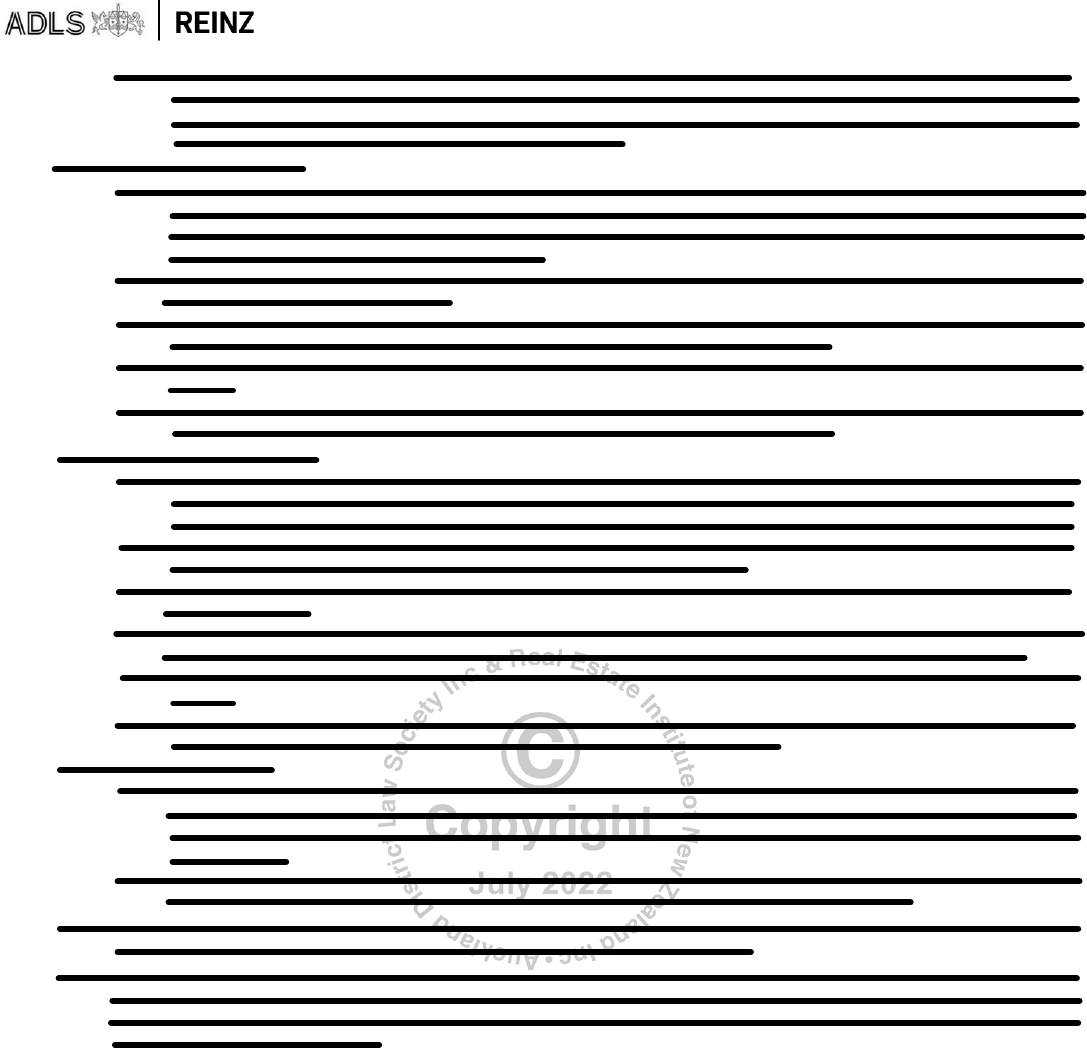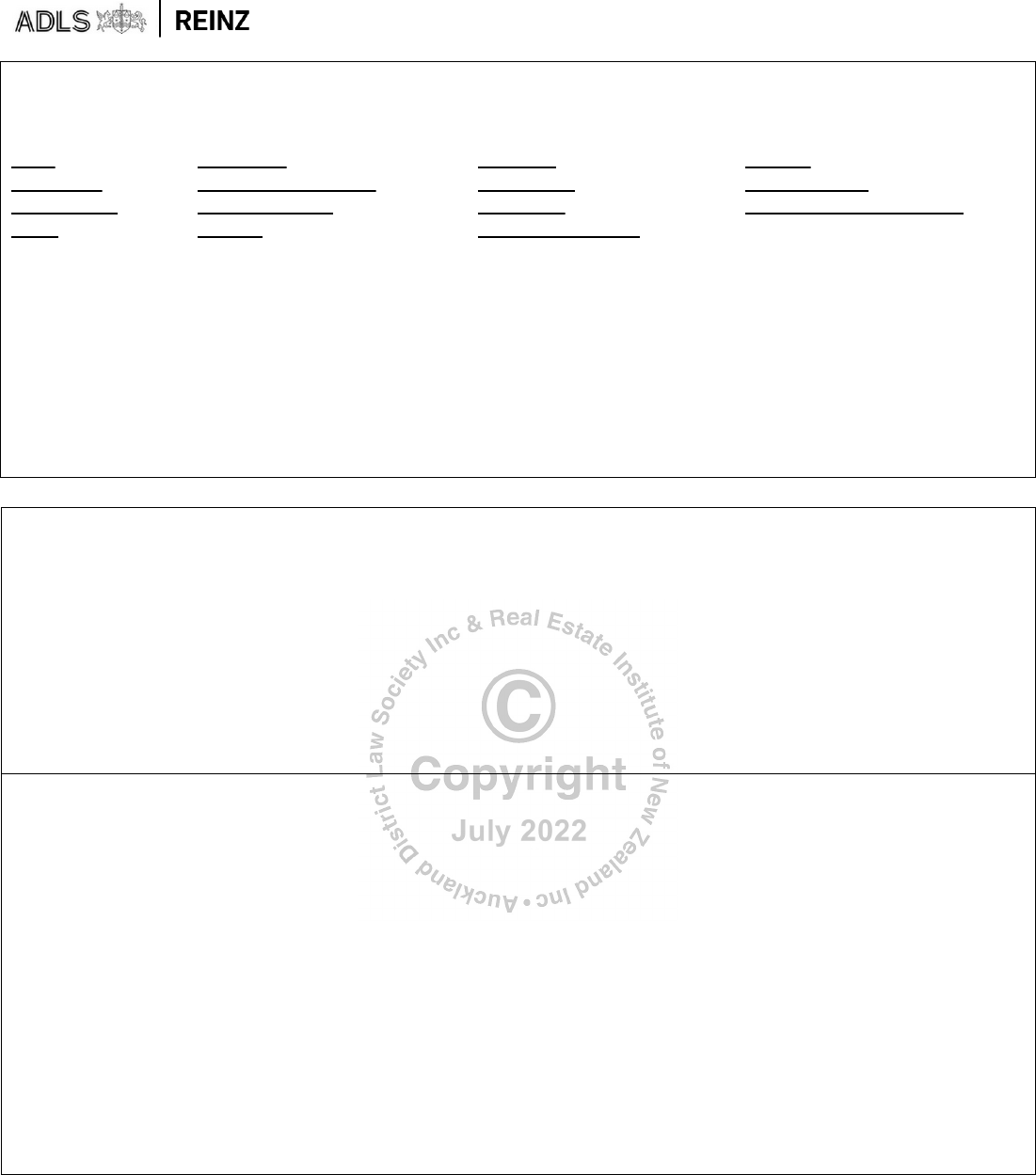
Eleventh Edition 2022 (2)
AGREEMENT FOR SALE AND PURCHASE OF REAL ESTATE
This form is approved by the Real Estate Institute of New Zealand Incorporated and by Auckland District Law Society Incorporated.
DATE:
VENDOR:
PURCHASER: and/or nominee
The vendor is registered under the GST Act in respect of the transaction and/or will be so registered at settlement: Yes/No
If “Yes”, Schedule 1 must be completed by the parties.
Purchase price allocation (PPA) is relevant to the parties for income tax and/or GST purposes: Vendor Yes/No
If both parties answer “Yes”, use of the PPA addendum for this agreement is recommended. Purchaser/Purchaser’s Nominee Yes/No
PROPERTY
Address:
Estate: FREEHOLD LEASEHOLD STRATUM IN FREEHOLD
STRATUM IN LEASEHOLD CROSS-LEASE (FREEHOLD) CROSS-LEASE (LEASEHOLD)
If none of the above are deleted, the estate being sold is the first option of freehold.
Legal Description:
Area (more or less): Lot/Flat/Unit: DP: Record of Title (unique identifier):
PAYMENT OF PURCHASE PRICE
Purchase price: $ Plus GST (if any) OR Inclusive of GST (if any)
If neither is deleted, the purchase price includes GST (if any).
GST date (refer clause 13.0):
Deposit (refer clause 2.0): $
Balance of purchase price to be paid or satisfied as follows:
(1) By payment in cleared funds on the settlement date which is:
OR
(2) In the manner described in the Further Terms of Sale. Interest rate for late settlement: % p.a.
CONDITIONS (refer clause 9.0)
Finance required (clause 9.1): Yes/No OIA consent required (clause 9.6): Yes/No
Finance date: OIA date (clause 9.8):
LIM required (clause 9.3): Yes/No Land Act consent required (clause 9.7): Yes/No
Building report required (clause 9.4): Yes/No Land Act date (clause 9.8):
Toxicology report required (clause 9.5): Yes/No
TENANCIES Yes/No
Particulars of any tenancies are set out in Schedule 3 or another schedule attached to this agreement by the parties.
It is agreed that the vendor sells and the purchaser purchases the property, and any chattels listed, on the terms and conditions of this agreement.
Release date: 19 July 2022
© AUCKLAND DISTRICT LAW SOCIETY INC. & REAL ESTATE INSTITUTE OF NEW ZEALAND INC. All Rights Reserved. See full terms of copyright on the back page.
L & K Properties Limited
Grand Vesta Stage 2 David St, Caversham, Dunedin City
68m2 (subject to final survey)
Lot 33 & 1/42 share of Lot 100 &
1/30 share of Lot
as shown on the attached
stage 2 scheme plan
New title to be issued
10% of the purchase price to be paid to Highland Real Estate Group Trust Account immediately upon this agreement
becoming unconditional. ANZ Bank of New Zealand Limited Queenstown branch 06-0949-0170217-02
15
_____ working days from the date of this agreement
103

Eleventh Edition 2022 (2)
© ADLS & REINZ. All Rights Reserved.
GENERAL TERMS OF SALE
1.0 Definitions, time for performance, notices and interpretation
1.1 Definitions
(1) Unless the context requires a different interpretation, words and phrases not otherwise defined have the same meanings
ascribed to those words and phrases in the Goods and Services Tax Act 1985, the Property Law Act 2007, the Resource
Management Act 1991 or the Unit Titles Act 2010.
(2) "Accessory unit", "owner", "principal unit", "unit", and "unit plan" have the meanings ascribed to those terms in the Unit
Titles Act.
(3) "Agreement" means this document including the front page, these General Terms of Sale, any Further Terms of Sale, and any
schedules and attachments.
(4) "Associated person", "conveyancer", "offshore RLWT person", "residential land purchase amount", "RLWT", "RLWT certificate
of exemption" and "RLWT rules" have the meanings ascribed to those terms in the Income Tax Act 2007.
(5) "Building", "building consent", "code compliance certificate", "commercial on-seller", "compliance schedule" and "household
unit" have the meanings ascribed to those terms in the Building Act.
(6) "Building Act" means the Building Act 1991 and/or the Building Act 2004.
(7) "Building warrant of fitness" means a building warrant of fitness supplied to a territorial authority under the Building Act.
(8) "Cleared funds" means an electronic transfer of funds that has been made strictly in accordance with the requirements
set out in the PLS Guidelines.
(9) "Commissioner" has the meaning ascribed to that term in the Tax Administration Act 1994.
(10) "Default GST" means any additional GST, penalty (civil or otherwise), interest, or other sum imposed on the vendor (or where
the vendor is or was a member of a GST group its representative member) under the GST Act or the Tax Administration Act
1994 by reason of non-payment of any GST payable in respect of the supply made under this agreement but does not include
any such sum levied against the vendor (or where the vendor is or was a member of a GST group its representative member)
by reason of a default or delay by the vendor after payment of the GST to the vendor by the purchaser.
(11) "Electronic instrument" has the same meaning as ascribed to that term in the Land Transfer Act 2017.
(12) "Going concern", "goods", "principal place of residence", "recipient", "registered person", "registration number", "supply",
"taxable activity" and "taxable supply" have the meanings ascribed to those terms in the GST Act.
(13) "GST" means Goods and Services Tax arising pursuant to the Goods and Services Tax Act 1985 and "GST Act" means the Goods
and Services Tax Act 1985.
(14) "Landonline Workspace" means an electronic workspace facility approved by the Registrar-General of Land pursuant to the
provisions of the Land Transfer Act 2017.
(15) "Leases" means any tenancy agreement, agreement to lease (if applicable), lease, sublease, or licence to occupy in respect of
the property, and includes any receipt or other evidence of payment of any bond and any formal or informal document or
letter evidencing any variation, renewal, extension, review, or assignment.
(16) "LIM" means a land information memorandum issued pursuant to the Local Government Official Information and Meetings
Act 1987.
(17) "LINZ" means Land Information New Zealand.
(18) "Local authority" means a territorial authority or a regional council.
(19) "OIA consent" means consent to purchase the property under the Overseas Investment Act 2005.
(20) "PLS Guidelines" means the most recent edition, as at the date of this agreement, of the New Zealand Law Society Property
Law Section Guidelines, issued by the New Zealand Law Society.
(21) "Proceedings" means any application to any court or tribunal or any referral or submission to mediation, adjudication or
arbitration or any other dispute resolution procedure.
(22) "Property" means the property described in this agreement.
(23) "Purchase price" means the total purchase price stated in this agreement which the purchaser has agreed to pay the vendor
for the property and the chattels included in the sale.
(24) "Purchase price allocation" means an allocation of the purchase price, and (if applicable) any other consideration for the
property and the chattels included in the sale, to the property, chattels or any part thereof that affects a person’s tax position
under the Income Tax Act 2007 and/or the GST Act.
(25) "Regional council" means a regional council within the meaning of the Local Government Act 2002.
(26) "Remote settlement" means settlement of the sale and purchase of the property by way of the purchaser’s lawyer paying the
moneys due and payable on the settlement date directly into the trust account of the vendor’s lawyer, in consideration of
the vendor agreeing to meet the vendor’s obligations under clause 3.8(2), pursuant to the protocol for remote settlement
recommended in the PLS Guidelines.
(27) "Residential (but not otherwise sensitive) land" has the meaning ascribed to that term in the Overseas Investment Act 2005.
(28) "Rules" means body corporate operational rules under the Unit Titles Act.
(29) "Secure web document exchange" means an electronic messaging service enabling messages and electronic documents to
be posted by one party to a secure website to be viewed by the other party immediately after posting.
(30) "Settlement" means (unless otherwise agreed by the parties in writing) the moment in time when the vendor and purchaser
have fulfilled their obligations under clause 3.8.
(31) "Settlement date" means the date specified as such in this agreement.
(32) "Settlement statement" means a statement showing the purchase price, plus any GST payable by the purchaser in addition
to the purchase price, less any deposit or other payments or allowances to be credited to the purchaser, together with
apportionments of all incomings and outgoings apportioned at the settlement date.
(33) "Tax information" and "tax statement" have the meanings ascribed to those terms in the Land Transfer Act 2017.
(34) "Territorial authority" means a territorial authority within the meaning of the Local Government Act 2002.
(35) "Title" includes where appropriate a record of title within the meaning of the Land Transfer Act 2017.

Eleventh Edition 2022 (2)
© ADLS & REINZ. All Rights Reserved.
(36) "Unit title" means a unit title under the Unit Titles Act.
(37) "Unit Titles Act" means the Unit Titles Act 2010.
(38) "Working day" means any day of the week other than:
(a) Saturday, Sunday, Waitangi Day, Good Friday, Easter Monday, Anzac Day, the Sovereign’s Birthday and Labour Day;
(b) if Waitangi Day or Anzac Day falls on a Saturday or Sunday, the following Monday;
(c) a day in the period commencing on the 24th day of December in any year and ending on the 5th day of January (or in
the case of clause 9.3(2) the 15th day of January) in the following year, both days inclusive;
(d) the day observed as the anniversary of any province in which the property is situated; and
(e) the day on which a public holiday is observed to acknowledge Matariki, pursuant to the Te Kāhui o Matariki Public
Holiday Act 2022.
A working day shall be deemed to commence at 9.00 am and to terminate at 5.00 pm.
1.2 Unless a contrary intention appears on the front page or elsewhere in this agreement:
(1) the interest rate for late settlement is equivalent to the interest rate charged by the Inland Revenue Department on unpaid
tax under the Tax Administration Act 1994 during the period for which the interest rate for late settlement is payable, plus
5% per annum; and
(2) a party is in default if it did not do what it has contracted to do to enable settlement to occur, regardless of the cause of such
failure.
1.3 Time for Performance
(1) Where the day nominated for settlement or the fulfilment of a condition is not a working day, then the settlement date or
the date for fulfilment of the condition shall be the last working day before the day so nominated.
(2) Any act done pursuant to this agreement by a party, including service of notices, after 5.00 pm on a working day, or on a day
that is not a working day, shall be deemed to have been done at 9.00 am on the next succeeding working day.
(3) Where two or more acts done pursuant to this agreement, including service of notices, are deemed to have been done at the
same time, they shall take effect in the order in which they would have taken effect but for clause 1.3(2).
1.4 Notices
The following apply to all notices between the parties relevant to this agreement, whether authorised by this agreement or by the
general law:
(1) All notices must be served in writing.
(2) Any notice under section 28 of the Property Law Act 2007, where the purchaser is in possession of the property, must be
served in accordance with section 353 of that Act.
(3) All other notices, unless otherwise required by the Property Law Act 2007, must be served by one of the following means:
(a) on the party as authorised by sections 354 to 361 of the Property Law Act 2007, or
(b) on the party or on the party’s lawyer:
(i) by personal delivery; or
(ii) by posting by ordinary mail; or
(iii) by email; or
(iv) in the case of the party’s lawyer only, by sending by document exchange or, if both parties’ lawyers have agreed
to subscribe to the same secure web document exchange for this agreement, by secure web document exchange.
(4) In respect of the means of service specified in clause 1.4(3)(b), a notice is deemed to have been served:
(a) in the case of personal delivery, when received by the party or at the lawyer’s office;
(b) in the case of posting by ordinary mail, on the third working day following the date of posting to the address for service
notified in writing by the party or to the postal address of the lawyer’s office;
(c) in the case of email:
(i) when sent to the email address provided for the party or the party’s lawyer on the back page; or
(ii) any other email address notified subsequently in writing by the party or the party’s lawyer (which shall supersede
the email address on the back page); or
(iii) if no such email address is provided on the back page or notified subsequently in writing, the office email address
of the party’s lawyer’s firm appearing on the firm’s letterhead or website;
(d) in the case of sending by document exchange, on the second working day following the date of sending to the document
exchange number of the lawyer’s office;
(e) in the case of sending by secure web document exchange, on the first working day following the date of sending to the
secure web document exchange.
(5) Any period of notice required to be given under this agreement shall be computed by excluding the day of service.
1.5 Interpretation and Execution
(1) If there is more than one vendor or purchaser, the liability of the vendors or of the purchasers, as the case may be, is joint
and several.
(2) Where the purchaser executes this agreement with provision for a nominee, or as agent for an undisclosed or disclosed but
unidentified principal, or on behalf of a company to be formed, the purchaser shall at all times remain liable for all obligations
on the part of the purchaser.
(3) If any inserted term (including any Further Terms of Sale) conflicts with the General Terms of Sale the inserted term shall
prevail.
(4) Headings are for information only and do not form part of this agreement.
(5) References to statutory provisions shall be construed as references to those provisions as they may be amended or re-enacted
or as their application is modified by other provisions from time to time.
(6) Reference to a party’s lawyer includes reference to a conveyancing practitioner (as defined in the Lawyers and Conveyancers
Act 2006), engaged by that party, provided that all actions of that conveyancing practitioner (including without limitation any
actions in respect of any undertaking or in respect of settlement) must strictly accord with the PLS Guidelines.

Eleventh Edition 2022 (2)
© ADLS & REINZ. All Rights Reserved.
2.0 Deposit
2.1 The purchaser shall pay the deposit to the vendor or the vendor’s agent immediately upon execution of this agreement by both
parties or at such other time as is specified in this agreement.
2.2 If the deposit is not paid on the due date for payment, the vendor may at any time thereafter serve on the purchaser notice requiring
payment. If the purchaser fails to pay the deposit on or before the third working day after service of the notice, time being of the
essence, the vendor may cancel this agreement by serving notice of cancellation on the purchaser. No notice of cancellation shall be
effective if the deposit has been paid before the notice of cancellation is served.
2.3 The deposit shall be in part payment of the purchase price.
2.4 The person to whom the deposit is paid shall hold it as a stakeholder until:
(1) the requisition procedure under clause 6.0 is completed without either party cancelling this agreement; and
(2) where this agreement is entered into subject to any condition(s) expressed in this agreement, each such condition has been
fulfilled or waived; and
(3) where the property is a unit title:
(a) a pre-settlement disclosure statement, certified correct by the body corporate, under section 147 of the Unit Titles Act;
and
(b) an additional disclosure statement under section 148 of the Unit Titles Act (if requested by the purchaser within the
time prescribed in section 148(2)),
have been provided to the purchaser by the vendor within the times prescribed in those sections or otherwise the purchaser
has given notice under section 149(2) of the Unit Titles Act to postpone the settlement date until after the disclosure
statements have been provided; or
(4) this agreement is:
(a) cancelled pursuant to clause 6.2(3)(c); or
(b) avoided pursuant to clause 9.10(5),
(5) where the property is a unit title and the purchaser, having the right to cancel this agreement pursuant to section 151(2) of
the Unit Titles Act, has cancelled this agreement pursuant to that section, or has elected not to cancel by giving notice to the
vendor, or by completing settlement of the purchase.
2.5 Where the person to whom the deposit is paid is a real estate agent, the period for which the agent must hold the deposit as a
stakeholder pursuant to clause 2.4 shall run concurrently with the period for which the agent must hold the deposit under section
123 of the Real Estate Agents Act 2008, but the agent must hold the deposit for the longer of those two periods, or such lesser period
as is agreed between the parties in writing as required by section 123 of the Real Estate Agents Act 2008, but in no event shall the
deposit be released prior to the expiry of the requisition period under clause 6.0, unless the requisition period is expressly waived in
writing.
3.0 Possession and Settlement
Possession
3.1 Unless particulars of a tenancy are included in this agreement, the property is sold with vacant possession and the vendor shall so
yield the property on the settlement date.
3.2 If the property is sold with vacant possession, then subject to the rights of any tenants of the property, the vendor shall permit the
purchaser or any person authorised by the purchaser in writing, upon reasonable notice:
(1) to enter the property on one occasion prior to the settlement date for the purposes of examining the property, chattels and
fixtures which are included in the sale; and
(2) to re-enter the property no later than the day prior to the settlement date to confirm compliance by the vendor with any
agreement made by the vendor to carry out any work on the property, the chattels and the fixtures.
3.3 Possession shall be given and taken on the settlement date. Outgoings and incomings in respect of the settlement date are the
responsibility of and belong to the vendor.
3.4 On the settlement date, the vendor shall make available to the purchaser keys to all exterior doors that are locked by key, electronic
door openers to all doors that are opened electronically, and the keys and/or security codes to any alarms. The vendor does not have
to make available keys, electronic door openers, and security codes where the property is tenanted and these are held by the tenant.
Settlement
3.5 The vendor shall prepare, at the vendor’s own expense, a settlement statement. The vendor shall tender the settlement statement
to the purchaser or the purchaser’s lawyer a reasonable time prior to the settlement date.
3.6 The purchaser’s lawyer shall:
(1) within a reasonable time prior to the settlement date create a Landonline Workspace for the transaction, notify the vendor’s
lawyer of the dealing number allocated by LINZ, and prepare in that workspace a transfer instrument in respect of the
property; and
(2) prior to settlement:
(a) lodge in that workspace the tax information contained in the transferee’s tax statement; and
(b) certify and sign the transfer instrument.
3.7 The vendor’s lawyer shall:
(1) within a reasonable time prior to the settlement date prepare in that workspace all other electronic instruments required to
confer title on the purchaser in terms of the vendor’s obligations under this agreement; and
(2) prior to settlement:
(a) lodge in that workspace the tax information contained in the transferor’s tax statement; and
(b) have those instruments and the transfer instrument certified, signed and, where possible, pre-validated.
3.8 On the settlement date:

Eleventh Edition 2022 (2)
© ADLS & REINZ. All Rights Reserved.
(1) the balance of the purchase price, interest and other moneys, if any, shall be paid by the purchaser in cleared funds or
otherwise satisfied as provided in this agreement (credit being given for any amount payable by the vendor under clause 3.12
or 3.13, or for any deduction allowed to the purchaser under clause 5.2, or for any compensation agreed by the vendor in
respect of a claim made by the purchaser pursuant to clause 10.2(1), or for any interim amount the purchaser is required to
pay to a stakeholder pursuant to clause 10.8);
(2) the vendor's lawyer shall immediately thereafter:
(a) release or procure the release of the transfer instrument and the other instruments mentioned in clause 3.7(1) so that
the purchaser’s lawyer can then submit them for registration;
(b) pay to the purchaser’s lawyer the LINZ registration fees on all of the instruments mentioned in clause 3.7(1), unless
these fees will be invoiced to the vendor’s lawyer by LINZ directly; and
(c) deliver to the purchaser’s lawyer any other documents that the vendor must provide to the purchaser on settlement in
terms of this agreement, including where this agreement provides for the property to be sold tenanted, all leases
relating to the tenancy that are held by the vendor and a notice from the vendor to each tenant advising them of the
sale of the property and directing them to pay to the purchaser as landlord, in such manner as the purchaser may
prescribe, all rent or other moneys payable under the leases.
3.9 All obligations under clause 3.8 are interdependent.
3.10 The parties shall complete settlement by way of remote settlement in accordance with the PLS Guidelines. Where the purchaser
considers it is necessary or desirable to tender settlement, this may be effected (in addition to any other valid form of tender) by the
purchaser’s lawyer providing to the vendor’s lawyer a written undertaking that:
(1) the purchaser is ready, willing, and able to settle;
(2) the purchaser’s lawyer has certified and signed the transfer instrument and any other instruments in the Landonline
Workspace for the transaction that must be signed on behalf of the purchaser; and
(3) the purchaser’s lawyer holds in their trust account in cleared funds the amount that the purchaser must pay on settlement.
Last-Minute Settlement
3.11 If due to the delay of the purchaser, settlement takes place between 4.00 pm and 5.00 pm on the settlement date (“last-minute
settlement”), the purchaser shall pay the vendor:
(1) one day’s interest at the interest rate for late settlement on the portion of the purchase price paid in the last-minute
settlement; and
(2) if the day following the last-minute settlement is not a working day, an additional day’s interest (calculated in the same
manner) for each day until, but excluding, the next working day.
Purchaser Default: Late Settlement
3.12 If any portion of the purchase price is not paid upon the due date for payment, then, provided that the vendor provides reasonable
evidence of the vendor’s ability to perform any obligation the vendor is obliged to perform on that date in consideration for such
payment:
(1) the purchaser shall pay to the vendor interest at the interest rate for late settlement on the portion of the purchase price so
unpaid for the period from the due date for payment until payment (“the default period”); but nevertheless, this stipulation
is without prejudice to any of the vendor’s rights or remedies including any right to claim for additional expenses and
damages. For the purposes of this clause, a payment made on a day other than a working day or after the termination of a
working day shall be deemed to be made on the next following working day and interest shall be computed accordingly; and
(2) the vendor is not obliged to give the purchaser possession of the property or to pay the purchaser any amount for remaining
in possession, unless this agreement relates to a tenanted property, in which case the vendor must elect either to:
(a) account to the purchaser on settlement for incomings in respect of the property which are payable and received during
the default period, in which event the purchaser shall be responsible for the outgoings relating to the property during
the default period; or
(b) retain such incomings in lieu of receiving interest from the purchaser pursuant to clause 3.12(1).
(3) If the parties are unable to agree upon any amount payable under this clause 3.12, either party may make a claim under
clause 10.0.
Vendor Default: Late Settlement or Failure to Give Possession
3.13 (1) For the purposes of this clause 3.13:
(a) the default period means:
(i) in clause 3.13(2), the period from the settlement date until the date when the vendor is able and willing to provide
vacant possession and the purchaser takes possession; and
(ii) in clause 3.13(3), the period from the date the purchaser takes possession until the date when settlement occurs;
and
(iii) in clause 3.13(5), the period from the settlement date until the date when settlement occurs; and
(b) the vendor shall be deemed to be unwilling to give possession if the vendor does not offer to give possession.
(2) If this agreement provides for vacant possession but the vendor is unable or unwilling to give vacant possession on the
settlement date, then, provided that the purchaser provides reasonable evidence of the purchaser's ability to perform the
purchaser's obligations under this agreement:
(a) the vendor shall pay the purchaser, at the purchaser’s election, either:
(i) compensation for any reasonable costs incurred for temporary accommodation for persons and storage of
chattels during the default period; or
(ii) an amount equivalent to interest at the interest rate for late settlement on the entire purchase price during the
default period; and

Eleventh Edition 2022 (2)
© ADLS & REINZ. All Rights Reserved.
(b) the purchaser shall pay the vendor an amount equivalent to the interest earned or which would be earned on overnight
deposits lodged in the purchaser’s lawyer’s trust bank account on such portion of the purchase price (including any
deposit) as is payable under this agreement on or by the settlement date but remains unpaid during the default period
less:
(i) any withholding tax; and
(ii) any bank or legal administration fees and commission charges; and
(iii) any interest payable by the purchaser to the purchaser’s lender during the default period in respect of any
mortgage or loan taken out by the purchaser in relation to the purchase of the property.
(3) If this agreement provides for vacant possession and the vendor is able and willing to give vacant possession on the settlement
date, then, provided the purchaser provides reasonable evidence of the purchaser's ability to perform the purchaser's
obligations under this agreement, the purchaser may elect to take possession in which case the vendor shall not be liable to
pay any interest or other moneys to the purchaser but the purchaser shall pay the vendor the same amount as that specified
in clause 3.13(2)(b) during the default period. A purchaser in possession under this clause 3.13(3) is a licensee only.
(4) Notwithstanding the provisions of clause 3.13(3), the purchaser may elect not to take possession when the purchaser is
entitled to take it. If the purchaser elects not to take possession, the provisions of clause 3.13(2) shall apply as though the
vendor were unable or unwilling to give vacant possession on the settlement date.
(5) If this agreement provides for the property to be sold tenanted then, provided that the purchaser provides reasonable
evidence of the purchaser's ability to perform the purchaser's obligations under this agreement, the vendor shall on
settlement account to the purchaser for incomings which are payable and received in respect of the property during the
default period less the outgoings paid by the vendor during that period. Apart from accounting for such incomings, the vendor
shall not be liable to pay any other moneys to the purchaser but the purchaser shall pay the vendor the same amount as that
specified in clause 3.13(2)(b) during the default period.
(6) The provisions of this clause 3.13 shall be without prejudice to any of the purchaser’s rights or remedies including any right
to claim for any additional expenses and damages suffered by the purchaser.
(7) If the parties are unable to agree upon any amount payable under this clause 3.13, either party may make a claim under
clause 10.0.
Deferment of Settlement and Possession
3.14 If
(1) this is an agreement for the sale by a commercial on-seller of a household unit; and
(2) a code compliance certificate has not been issued by the settlement date in relation to the household unit,
then, unless the parties agree otherwise (in which case the parties shall enter into a written agreement in the form (if any) prescribed
by the Building (Forms) Regulations 2004), the settlement date shall be deferred to the fifth working day following the date upon
which the vendor has given the purchaser notice that the code compliance certificate has been issued (which notice must be
accompanied by a copy of the certificate).
3.15 In every case, if neither party is ready, willing, and able to settle on the settlement date, the settlement date shall be deferred to the
third working day following the date upon which one of the parties gives notice it has become ready, willing, and able to settle.
3.16 If
(1) the property is a unit title;
(2) the settlement date is deferred pursuant to either clause 3.14 or clause 3.15; and
(3) the vendor considers on reasonable grounds that an extension of time is necessary or desirable in order for the vendor to
comply with the warranty by the vendor in clause 8.2(3),
then the vendor may extend the settlement date:
(a) where there is a deferment of the settlement date pursuant to clause 3.14, to the tenth working day after the date
upon which the vendor gives the purchaser notice that the code compliance certificate has been issued, provided the
vendor gives notice of the extension to the purchaser no later than the second working day after such notice; or
(b) where there is a deferment of the settlement date pursuant to clause 3.15, to the tenth working day after the date
upon which one of the parties gives notice that it has become ready, willing, and able to settle, provided the vendor
gives notice of the extension to the purchaser no later than the second working day after such notice.
New Title Provision
3.17 (1) Where
(a) the transfer of the property is to be registered against a new title yet to be issued; and
(b) a search copy, as defined in section 60 of the Land Transfer Act 2017, of that title is not obtainable by the tenth working
day prior to the settlement date,
then, unless the purchaser elects that settlement shall still take place on the agreed settlement date, the settlement
date shall be deferred to the tenth working day after the later of the date on which:
(i) the vendor has given the purchaser notice that a search copy is obtainable; or
(ii) the requisitions procedure under clause 6.0 is complete.
(2) Clause 3.17(1) shall not apply where it is necessary to register the transfer of the property to enable a plan to be deposited
and title to the property to be issued.
4.0 Residential Land Withholding Tax
4.1 If the vendor does not have a conveyancer or the vendor and the purchaser are associated persons, then:
(1) the vendor must provide the purchaser or the purchaser’s conveyancer, on or before the second working day before the due
date for payment of the first residential land purchase amount payable under this agreement, with:
(a) sufficient information to enable the purchaser or the purchaser’s conveyancer to determine to their reasonable
satisfaction whether section 54C of the Tax Administration Act 1994 applies to the sale of the property; and

Eleventh Edition 2022 (2)
© ADLS & REINZ. All Rights Reserved.
(b) if the purchaser or the purchaser’s conveyancer determines to their reasonable satisfaction that section 54C of the Tax
Administration Act 1994 does apply, all of the information required by that section and either an RLWT certificate of
exemption in respect of the sale or otherwise such other information that the purchaser or the purchaser’s conveyancer
may reasonably require to enable the purchaser or the purchaser’s conveyancer to determine to their reasonable
satisfaction the amount of RLWT that must be withheld from each residential land purchase amount;
(2) the vendor shall be liable to pay any costs reasonably incurred by the purchaser or the purchaser’s conveyancer in relation
to RLWT, including the cost of obtaining professional advice in determining whether there is a requirement to withhold RLWT
and the amount of RLWT that must be withheld, if any; and
(3) any payments payable by the purchaser on account of the purchase price shall be deemed to have been paid to the extent
that:
(a) RLWT has been withheld from those payments by the purchaser or the purchaser’s conveyancer as required by the
RLWT rules; and
(b) any costs payable by the vendor under clause 4.1(2) have been deducted from those payments by the purchaser or the
purchaser’s conveyancer.
4.2 If the vendor does not have a conveyancer or the vendor and the purchaser are associated persons and if the vendor fails to provide
the information required under clause 4.1(1), then the purchaser may:
(1) defer the payment of the first residential land purchase amount payable under this agreement (and any residential land
purchase amount that may subsequently fall due for payment) until such time as the vendor supplies that information; or
(2) on the due date for payment of that residential land purchase amount, or at any time thereafter if payment has been deferred
by the purchaser pursuant to this clause and the vendor has still not provided that information, treat the sale of the property
as if it is being made by an offshore RLWT person where there is a requirement to pay RLWT.
4.3 If pursuant to clause 4.2 the purchaser treats the sale of the property as if it is being made by an offshore RLWT person where there
is a requirement to pay RLWT, the purchaser or the purchaser’s conveyancer may:
(1) make a reasonable assessment of the amount of RLWT that the purchaser or the purchaser’s conveyancer would be required
by the RLWT rules to withhold from any residential land purchase amount if the sale is treated in that manner; and
(2) withhold that amount from any residential land purchase amount and pay it to the Commissioner as RLWT.
4.4 Any amount withheld by the purchaser or the purchaser’s conveyancer pursuant to clause 4.3 shall be treated as RLWT that the
purchaser or the purchaser’s conveyancer is required by the RLWT rules to withhold.
4.5 The purchaser or the purchaser’s conveyancer shall give notice to the vendor a reasonable time before payment of any sum due to
be paid on account of the purchase price of:
(1) the costs payable by the vendor under clause 4.1(2) that the purchaser or the purchaser’s conveyancer intends to deduct;
and
(2) the amount of RLWT that the purchaser or the purchaser’s conveyancer intends to withhold.
5.0 Risk and insurance
5.1 The property and chattels shall remain at the risk of the vendor until possession is given and taken.
5.2 If, prior to the giving and taking of possession, the property is destroyed or damaged, and such destruction or damage has not been
made good by the settlement date, then the following provisions shall apply:
(1) if the destruction or damage has been sufficient to render the property untenantable and it is untenantable on the settlement
date, the purchaser may:
(a) complete the purchase at the purchase price, less a sum equal to any insurance moneys received or receivable by or on
behalf of the vendor in respect of such destruction or damage, provided that no reduction shall be made to the purchase
price if the vendor’s insurance company has agreed to reinstate for the benefit of the purchaser to the extent of the
vendor’s insurance cover; or
(b) cancel this agreement by serving notice on the vendor in which case the vendor shall return to the purchaser
immediately the deposit and any other moneys paid by the purchaser, and neither party shall have any right or claim
against the other arising from this agreement or its cancellation;
(2) if the property is not untenantable on the settlement date, the purchaser shall complete the purchase at the purchase price
less a sum equal to the amount of the diminution in value of the property which, to the extent that the destruction or damage
to the property can be made good, shall be deemed to be equivalent to the reasonable cost of reinstatement or repair;
(3) if the property is zoned for rural purposes under an operative District Plan, damage to the property shall be deemed to have
rendered the property untenantable where the diminution in value exceeds an amount equal to 20% of the purchase price;
and
(4) if the amount of the diminution in value is disputed, the parties shall follow the same procedure as that set out in clause 10.8
for when an amount of compensation is disputed.
5.3 The purchaser shall not be required to take over any insurance policies held by the vendor.
6.0 Title, boundaries and requisitions
6.1 The vendor shall not be bound to point out the boundaries of the property except that on the sale of a vacant residential lot which is
not limited as to parcels the vendor shall ensure that all boundary markers required by the Cadastral Survey Act 2002 and any related
rules and regulations to identify the boundaries of the property are present in their correct positions at the settlement date.
6.2 (1) The purchaser is deemed to have accepted the vendor’s title except as to objections or requisitions which the purchaser is
entitled to make and notice of which the purchaser serves on the vendor on or before the earlier of:
(a) the tenth working day after the date of this agreement; or
(b) the settlement date.

Eleventh Edition 2022 (2)
© ADLS & REINZ. All Rights Reserved.
(2) Where the transfer of the property is to be registered against a new title yet to be issued, the purchaser is deemed to have
accepted the title except as to such objections or requisitions which the purchaser is entitled to make and notice of which
the purchaser serves on the vendor on or before the fifth working day following the date the vendor has given the purchaser
notice that the title has been issued and a search copy of it as defined in section 60 of the Land Transfer Act 2017 is obtainable.
(3) If the vendor is unable or unwilling to remove or comply with any objection or requisition as to title, notice of which has been
served on the vendor by the purchaser, then the following provisions will apply:
(a) the vendor shall notify the purchaser (“a vendor’s notice”) of such inability or unwillingness on or before the fifth
working day after the date of service of the purchaser’s notice;
(b) if the vendor does not give a vendor’s notice the vendor shall be deemed to have accepted the objection or requisition
and it shall be a requirement of settlement that such objection or requisition shall be complied with before settlement;
(c) if the purchaser does not on or before the fifth working day after service of a vendor’s notice notify the vendor that the
purchaser waives the objection or requisition, either the vendor or the purchaser may (notwithstanding any
intermediate negotiations) by notice to the other, cancel this agreement.
6.3 In the event of cancellation under clause 6.2(3), the purchaser shall be entitled to the immediate return of the deposit and any other
moneys paid under this agreement by the purchaser and neither party shall have any right or claim against the other arising from
this agreement or its cancellation. In particular, the purchaser shall not be entitled to any interest or to the expense of investigating
the title or to any compensation whatsoever.
6.4 (1) If the title to the property being sold is a cross-lease title or a unit title and there are:
(a) in the case of a cross-lease title:
(i) alterations to the external dimensions of any leased structure; or
(ii) buildings or structures not intended for common use which are situated on any part of the land that is not subject
to a restricted use covenant;
(b) in the case of a unit title, encroachments out of the principal unit or accessory unit title space (as the case may be):
then the purchaser may requisition the title under clause 6.2 requiring the vendor:
(c) in the case of a cross-lease title, to deposit a new plan depicting the buildings or structures and register a new cross-
lease or cross-leases (as the case may be) and any other ancillary dealings in order to convey good title; or
(d) in the case of a unit title, to deposit an amendment to the unit plan, a redevelopment plan or new unit plan (as the case
may be) depicting the principal and/or accessory units and register such transfers and any other ancillary dealings in
order to convey good title.
(2) The words “alterations to the external dimensions of any leased structure” shall only mean alterations which are attached to
the leased structure and enclosed.
6.5 The vendor shall not be liable to pay for or contribute towards the expense of erection or maintenance of any fence between the
property and any contiguous land of the vendor but this proviso shall not enure for the benefit of any subsequent purchaser of the
contiguous land; and the vendor shall be entitled to require the inclusion of a fencing covenant to this effect in any transfer of the
property.
7.0 Vendor’s warranties and undertakings
7.1 The vendor warrants and undertakes that at the date of this agreement the vendor has not:
(1) received any notice or demand and has no knowledge of any requisition or outstanding requirement:
(a) from any local or government authority or other statutory body; or
(b) under the Resource Management Act 1991; or
(c) from any tenant of the property; or
(d) from any other party; or
(2) given any consent or waiver,
which directly or indirectly affects the property and which has not been disclosed in writing to the purchaser.
7.2 The vendor warrants and undertakes that at the date of this agreement the vendor has no knowledge or notice of any fact which
might result in proceedings being instituted by or against the vendor or the purchaser in respect of the property.
7.3 The vendor warrants and undertakes that at settlement:
(1) The chattels included in the sale listed in Schedule 2 and all plant, equipment, systems or devices which provide any services
or amenities to the property, including, without limitation, security, heating, cooling, or air-conditioning, are delivered to the
purchaser in reasonable working order, but in all other respects in their state of repair as at the date of this agreement (fair
wear and tear excepted).
(2) All electrical and other installations on the property are free of any charge whatsoever and all chattels included in the sale
are the unencumbered property of the vendor.
(3) There are no arrears of rates, water rates or charges outstanding on the property and where the property is subject to a
targeted rate that has been imposed as a means of repayment of any loan, subsidy or other financial assistance made
available by or through the local authority, the amount required to remove the imposition of that targeted rate has been
paid.
(4) Where an allowance has been made by the vendor in the settlement statement for incomings receivable, the settlement
statement correctly records those allowances including, in particular, the dates up to which the allowances have been made.
(5) Where the vendor has done or caused or permitted to be done on the property any works:
(a) any permit, resource consent, or building consent required by law was obtained; and
(b) to the vendor’s knowledge, the works were completed in compliance with those permits or consents; and
(c) where appropriate, a code compliance certificate was issued for those works.
(6) Where under the Building Act, any building on the property sold requires a compliance schedule:
(a) the vendor has fully complied with any requirements specified in any compliance schedule issued by a territorial
authority under the Building Act in respect of the building;
(b) the building has a current building warrant of fitness; and

Eleventh Edition 2022 (2)
© ADLS & REINZ. All Rights Reserved.
(c) the vendor is not aware of any reason, that the vendor has not disclosed in writing to the purchaser, which would
prevent a building warrant of fitness from being supplied to the territorial authority when the building warrant of fitness
is next due.
(7) Since the date of this agreement, the vendor has not given any consent or waiver which directly or indirectly affects the
property.
(8) Any notice or demand received by the vendor, which directly or indirectly affects the property, after the date of this
agreement:
(a) from any local or government authority or other statutory body; or
(b) under the Resource Management Act 1991; or
(c) from any tenant of the property; or
(d) from any other party,
has been delivered forthwith by the vendor to either the purchaser or the purchaser’s lawyer, unless the vendor has paid or
complied with such notice or demand. If the vendor fails to so deliver or pay the notice or demand, the vendor shall be liable
for any penalty incurred.
7.4 If the property is or includes part only of a building, the warranty and undertaking in clause 7.3(6) does not apply. Instead the vendor
warrants and undertakes at the date of this agreement that, where under the Building Act the building of which the property forms
part requires a compliance schedule:
(1) to the vendor’s knowledge, there has been full compliance with any requirements specified in any compliance schedule issued
by a territorial authority under the Building Act in respect of the building;
(2) the building has a current building warrant of fitness; and
(3) the vendor is not aware of any reason, that the vendor has not disclosed in writing to the purchaser, which would prevent a
building warrant of fitness from being supplied to the territorial authority when the building warrant of fitness is next due.
7.5 The vendor warrants and undertakes that on or immediately after settlement:
(1) If the water and wastewater charges are determined by meter, the vendor will have the water meter read and will pay the
amount of the charge payable pursuant to that reading; but if the water supplier will not make special readings, the water
and wastewater charges shall be apportioned.
(2) Any outgoings included in the settlement statement are paid in accordance with the settlement statement and, where
applicable, to the dates shown in the settlement statement, or will be so paid immediately after settlement.
(3) The vendor will give notice of sale in accordance with the Local Government (Rating) Act 2002 to the territorial authority and
regional council in whose district the land is situated and will also give notice of the sale to every other authority that makes
and levies rates or charges on the land and to the supplier of water.
(4) Where the property is a unit title, the vendor will notify the body corporate in writing of the transfer of the property and the
name and address of the purchaser.
8.0 Unit title and cross-lease provisions
Unit Titles
8.1 If the property is a unit title, sections 144 to 153 of the Unit Titles Act require the vendor to provide to the purchaser a pre-contract
disclosure statement, a pre-settlement disclosure statement and, if so requested by the purchaser, an additional disclosure
statement.
8.2 If the property is a unit title, the vendor warrants and undertakes as follows:
(1) The information in the pre-contract disclosure statement provided to the purchaser was complete and correct.
(2) Apart from regular periodic contributions, no contributions have been levied or proposed by the body corporate that have
not been disclosed in writing to the purchaser.
(3) Not less than five working days before the settlement date, the vendor will provide:
(a) a certificate of insurance for all insurances effected by the body corporate under the provisions of section 135 of the
Unit Titles Act; and
(b) a pre-settlement disclosure statement from the vendor, certified correct by the body corporate, under section 147 of
the Unit Titles Act. Any periodic contributions to the operating account shown in that pre-settlement disclosure
statement shall be apportioned. There shall be no apportionment of contributions to any long-term maintenance fund,
contingency fund or capital improvement fund.
(4) There are no other amounts owing by the vendor under any provision of the Unit Titles Act.
(5) There are no unsatisfied judgments against the body corporate and no proceedings have been instituted against or by the
body corporate.
(6) No order or declaration has been made by any Court against the body corporate or the vendor under any provision of the
Unit Titles Act.
(7) The vendor has no knowledge or notice of any fact which might result in:
(a) the vendor or the purchaser incurring any other liability under any provision of the Unit Titles Act; or
(b) any proceedings being instituted by or against the body corporate; or
(c) any order or declaration being sought against the body corporate or the vendor under any provision of the Unit Titles
Act.
(8) The vendor is not aware of proposals to pass any body corporate resolution relating to its rules nor are there any unregistered
changes to the body corporate rules which have not been disclosed in writing to the purchaser.
(9) No lease, licence, easement, or special privilege has been granted by the body corporate in respect of any part of the common
property which has not been disclosed in writing to the purchaser.
(10) No resolution has been passed and no application has been made and the vendor has no knowledge of any proposal for:
(a) the transfer of the whole or any part of the common property;
(b) the addition of any land to the common property;
(c) the cancellation of the unit plan;

Eleventh Edition 2022 (2)
© ADLS & REINZ. All Rights Reserved.
(d) the deposit of an amendment to the unit plan, a redevelopment plan, or a new unit plan in substitution for the existing
unit plan; or
(e) any change to utility interest or ownership interest for any unit on the unit plan,
which has not been disclosed in writing to the purchaser.
(11) As at settlement, all contributions and other moneys payable by the vendor to the body corporate have been paid in full.
8.3 If the property is a unit title and if the vendor does not provide the certificates of insurance and the pre-settlement disclosure
statement under section 147 of the Unit Titles Act in accordance with the requirements of clause 8.2(3), then in addition to the
purchaser’s rights under sections 149 and 150 of the Unit Titles Act, the purchaser may:
(1) postpone the settlement date until the fifth working day following the date on which that information is provided to the
purchaser; or
(2) elect that settlement shall still take place on the settlement date.
8.4 If the property is a unit title, each party specifies that:
(1) any email address of that party’s lawyer provided on the back page of this agreement, or notified subsequently in writing by
that party’s lawyer shall be an address for service for that party for the purposes of section 205(1)(d) of the Unit Titles Act;
and
(2) if that party is absent from New Zealand, that party's lawyer shall be that party's agent in New Zealand for the purposes of
section 205(2) of the Unit Titles Act.
8.5 If the property is a unit title, any costs owing by the purchaser to the vendor pursuant to section 148(5) of the Unit Titles Act for
providing an additional disclosure statement shall be included in the moneys payable by the purchaser on settlement pursuant to
clause 3.8(1). Such costs may be deducted from the deposit if the purchaser becomes entitled to a refund of the deposit upon
cancellation or avoidance of this agreement.
8.6 Unauthorised Structures – Cross-Leases and Unit Titles
(1) Where structures (not stated in clause 6.0 to be requisitionable) have been erected on the property without:
(a) in the case of a cross-lease title, any required lessors’ consent; or
(b) in the case of a unit title, any required body corporate consent,
the purchaser may demand within the period expiring on the earlier of:
(i) the tenth working day after the date of this agreement; or
(ii) the settlement date,
that the vendor obtain the written consent of the current lessors or the body corporate (as the case may be) to such
improvements (“a current consent”) and provide the purchaser with a copy of such consent on or before the settlement date.
(2) Should the vendor be unwilling or unable to obtain a current consent, then the procedure set out in clauses 6.2(3) and 6.3
shall apply, with the purchaser’s demand under clause 8.6(1) being deemed to be an objection and requisition.
9.0 Conditions and mortgage terms
9.1 Finance condition
(1) If the purchaser has identified that finance is required on the front page of this agreement, this agreement is conditional
upon the purchaser arranging finance for such amount as the purchaser may require from a bank or other lending institution
of the purchaser’s choice on terms and conditions satisfactory to the purchaser in all respects on or before the finance date
shown on the front page of this agreement.
(2) If the purchaser avoids this agreement for failing to arrange finance in terms of clause 9.1(1), the purchaser must provide a
satisfactory explanation of the grounds relied upon by the purchaser, together with supporting evidence, immediately upon
request by the vendor.
9.2 Mortgage terms
(1) Any mortgage to be arranged pursuant to a finance condition shall be upon and subject to the terms and conditions currently
being required by the lender in respect of loans of a similar nature.
9.3 LIM condition
(1) If the purchaser has indicated on the front page of this agreement that a LIM is required:
(a) that LIM is to be obtained by the purchaser at the purchaser's cost;
(b) the purchaser is to request the LIM on or before the fifth working day after the date of this agreement; and
(c) this agreement is conditional upon the purchaser approving that LIM, provided that such approval must not be
unreasonably or arbitrarily withheld.
(2) If, on reasonable grounds, the purchaser does not approve the LIM, the purchaser shall give notice to the vendor (“the
purchaser’s notice”) on or before the fifteenth working day after the date of this agreement stating the particular matters in
respect of which approval is withheld and, if those matters are capable of remedy, what the purchaser reasonably requires
to be done to remedy those matters. If the purchaser does not give a purchaser’s notice the purchaser shall be deemed to
have approved the LIM. If through no fault of the purchaser, the LIM is not available on or before the fifteenth working day
after the date of this agreement and the vendor does not give an extension when requested, this condition shall not have
been fulfilled and the provisions of clause 9.10(5) shall apply.
(3) The vendor shall give notice to the purchaser (“the vendor's notice”) on or before the fifth working day after receipt of the
purchaser's notice advising whether or not the vendor is able and willing to comply with the purchaser's notice by the
settlement date.
(4) If the vendor does not give a vendor’s notice, or if the vendor’s notice advises that the vendor is unable or unwilling to comply
with the purchaser’s notice, and if the purchaser does not, on or before the tenth working day after the date on which the
purchaser’s notice is given, give notice to the vendor that the purchaser waives the objection to the LIM, this condition shall
not have been fulfilled and the provisions of clause 9.10(5) shall apply.

Eleventh Edition 2022 (2)
© ADLS & REINZ. All Rights Reserved.
(5) If the vendor gives a vendor's notice advising that the vendor is able and willing to comply with the purchaser's notice, this
condition is deemed to have been fulfilled, and it shall be a requirement of settlement that the purchaser's notice shall be
complied with, and also, if the vendor must carry out work on the property, that the vendor shall obtain the approval of the
territorial authority to the work done, both before settlement.
9.4 Building report condition
(1) If the purchaser has indicated on the front page of this agreement that a building report is required, this agreement is
conditional upon the purchaser obtaining at the purchaser’s cost on or before the fifteenth working day after the date of this
agreement a report on the condition of the buildings and any other improvements on the property that is satisfactory to the
purchaser, on the basis of an objective assessment.
(2) The report must be prepared in good faith by a suitably-qualified building inspector in accordance with accepted principles
and methods and it must be in writing.
(3) Subject to the rights of any tenants of the property, the vendor shall allow the building inspector to inspect the property at
all reasonable times upon reasonable notice for the purposes of preparation of the report.
(4) The building inspector may not carry out any invasive testing in the course of inspection without the vendor's prior written
consent.
(5) If the purchaser avoids this agreement for non-fulfilment of this condition pursuant to clause 9.10(5), the purchaser must
provide the vendor immediately upon request with a copy of the building inspector's report.
9.5 Toxicology report condition
(1) If the purchaser has indicated on the front page of this agreement that a toxicology report is required, this agreement is
conditional upon the purchaser obtaining at the purchaser’s cost on or before the fifteenth working day after the date of this
agreement, a toxicology report on the property that is satisfactory to the purchaser, on the basis of an objective assessment.
(2) The purpose of the toxicology report shall be to detect whether the property has been contaminated by the preparation,
manufacture or use of drugs including, but not limited to, methamphetamine.
(3) The report must be prepared in good faith by a suitably-qualified inspector using accepted principles and methods and it
must be in writing.
(4) Subject to the rights of any tenants of the property, the vendor shall allow the inspector to inspect the property at all
reasonable times upon reasonable notice for the purposes of carrying out the testing and preparation of the report.
(5) The inspector may not carry out any invasive testing in the course of the inspection without the vendor’s prior written
consent.
(6) If the purchaser avoids this agreement for non-fulfilment of this condition pursuant to clause 9.10(5), the purchaser must
provide the vendor immediately upon request with a copy of the inspector’s report.
9.6 OIA consent condition
(1) If the purchaser has indicated on the front page of this agreement that OIA consent is required, this agreement is conditional
upon OIA consent being obtained on or before the OIA date shown on the front page of this agreement on terms and
conditions that are satisfactory to the purchaser, acting reasonably, the purchaser being responsible for payment of the
application fee.
(2) If the purchaser has indicated on the front page of this agreement that OIA consent is not required, or has failed to indicate
whether it is required, then the purchaser warrants that the purchaser does not require OIA consent.
9.7 If this agreement relates to a transaction to which the Land Act 1948 applies, this agreement is conditional upon the vendor obtaining
the necessary consent by the Land Act date shown on the front page of this agreement.
9.8 If the Land Act date or OIA date is not shown on the front page of this agreement that date shall be the settlement date or that date
65 working days after the date of this agreement whichever is the sooner, except where the property comprises residential (but not
otherwise sensitive) land in which case that date shall be the settlement date or that date 20 working days after the date of this
agreement, whichever is the sooner.
9.9 Resource Management Act condition
(1) If this agreement relates to a transaction to which section 225 of the Resource Management Act 1991 applies then this
agreement is subject to the appropriate condition(s) imposed by that section.
9.10 Operation of conditions
If this agreement is expressed to be subject either to the above or to any other condition(s), then in relation to each such condition
the following shall apply unless otherwise expressly provided:
(1) The condition shall be a condition subsequent.
(2) The party or parties for whose benefit the condition has been included shall do all things which may reasonably be necessary
to enable the condition to be fulfilled by the date for fulfilment.
(3) Time for fulfilment of any condition and any extended time for fulfilment to a fixed date shall be of the essence.
(4) The condition shall be deemed to be not fulfilled until notice of fulfilment has been served by one party on the other party.
(5) If the condition is not fulfilled by the date for fulfilment, either party may at any time before the condition is fulfilled or waived
avoid this agreement by giving notice to the other. Upon avoidance of this agreement, the purchaser shall be entitled to the
immediate return of the deposit and any other moneys paid by the purchaser under this agreement and neither party shall
have any right or claim against the other arising from this agreement or its termination.
(6) At any time before this agreement is avoided, the purchaser may waive any finance condition and either party may waive any
other condition which is for the sole benefit of that party. Any waiver shall be by notice.
10.0 Claims for compensation
10.1 If the purchaser has not purported to cancel this agreement, the breach by the vendor of any term of this agreement does not defer
the purchaser’s obligation to settle, but that obligation is subject to the provisions of this clause 10.0.

Eleventh Edition 2022 (2)
© ADLS & REINZ. All Rights Reserved.
10.2 The provisions of this clause apply if:
(1) the purchaser (acting reasonably) claims a right to compensation for:
(a) a breach of any term of this agreement;
(b) a misrepresentation;
(c) a breach of section 9 or section 14 of the Fair Trading Act 1986;
(d) an equitable set-off, or
(2) there is a dispute between the parties regarding any amounts payable:
(a) under clause 3.12 or clause 3.13; or
(b) under clause 5.2.
10.3 To make a claim under this clause 10.0:
(1) the claimant must serve notice of the claim on the other party on or before the last working day prior to the settlement date,
time being of the essence (except for claims made after the settlement date for amounts payable under clause 3.12 or clause
3.13, in respect of which the claimant may serve notice of the claim on the other party at any time after a dispute arises over
those amounts); and
(2) the notice must:
(a) state the particular breach of the terms of this agreement, or the claim under clause 3.12, clause 3.13 or clause 5.2, or
for misrepresentation, or for breach of section 9 or section 14 of the Fair Trading Act 1986, or for an equitable set-off;
and
(b) state a genuine pre-estimate of the loss suffered by the claimant; and
(c) be particularised and quantified to the extent reasonably possible as at the date of the notice; and
(3) the claimant must not have made a prior claim under this clause 10.0 (to the intent that a claimant may make a claim
under this clause 10.0 on only one occasion, though such claim may address one or more of the elements in clause
10.2).
10.4 If the claimant is unable to give notice under clause 10.3 in respect of claims under clause 10.2(1) or clause 10.2(2)(b) on or before
the date that notice is due under clause 10.3(1) by reason of the conduct or omission of the other party, the notice may be served
on or before the working day immediately preceding the last working day on which settlement must take place under a settlement
notice served by either party under clause 11.1, time being of the essence.
10.5 If the amount of compensation is agreed, it shall be deducted from or added to the amount to be paid by the purchaser on settlement.
10.6 If the purchaser makes a claim for compensation under clause 10.2(1) but the vendor disputes that the purchaser has a valid or
reasonably arguable claim, then:
(1) the vendor must give notice to the purchaser within three working days after service of the purchaser’s notice under clause
10.3, time being of the essence; and
(2) the purchaser’s right to make the claim (on the basis that such claim is valid or reasonably arguable) shall be determined by
an experienced property lawyer or an experienced litigator appointed by the parties. If the parties cannot agree on the
appointee, the appointment shall be made on the application of either party by the president for the time being of the
Auckland District Law Society. The appointee’s costs shall be met by the party against whom the determination is made or
otherwise as determined by the appointee.
10.7 If the purchaser makes a claim for compensation under clause 10.2(1) and the vendor fails to give notice to the purchaser pursuant
to clause 10.6, the vendor is deemed to have accepted that the purchaser has a valid or reasonably arguable claim.
10.8 If it is accepted, or determined under clause 10.6, that the purchaser has a right to claim compensation under clause 10.2(1) but the
amount of compensation claimed is disputed, or if the claim is made under clause 10.2(2) and the amount of compensation claimed
is disputed, then:
(1) an interim amount shall be paid on settlement by the party required to a stakeholder until the amount of the claim is
determined;
(2) if the parties cannot agree on a stakeholder, the interim amount shall be paid to a stakeholder nominated on the application
of either party by the president for the time being of the Auckland District Law Society;
(3) the interim amount must be a reasonable sum having regard to the circumstances, except that:
(a) where the claim is under clause 3.13 the interim amount shall be the lower of the amount claimed, or an amount
equivalent to interest at the interest rate for late settlement for the relevant default period on such portion of the
purchase price (including any deposit) as is payable under this agreement on or by the settlement date;
(b) neither party shall be entitled or required to undertake any discovery process, except to the extent this is deemed
necessary by the appointee under clause 10.8(4) for the purposes of determining that the requirements of clauses
10.3(2)(b)-(c) have been met.
(4) if the parties cannot agree on the interim amount, the interim amount shall be determined by an experienced property
lawyer, an experienced litigator, or, where the claim for compensation is made under clause 5.2, an experienced registered
valuer or quantity surveyor appointed by the parties. The appointee’s costs shall be met equally by the parties, or otherwise
as determined by the appointee. If the parties cannot agree on the appointee, the appointment shall be made on the
application of either party by the president for the time being of the Auckland District Law Society;
(5) the amount of the claim determined to be payable shall not be limited by the interim amount;
(6) the stakeholder shall lodge the interim amount on an interest-bearing call deposit with a bank registered under the Reserve
Bank of New Zealand Act 1989 in the joint names of the vendor and the purchaser;
(7) the interest earned on the interim amount net of any withholding tax and any bank or legal administration fees and
commission charges shall follow the destination of the interim amount; and

Eleventh Edition 2022 (2)
© ADLS & REINZ. All Rights Reserved.
(8) apart from the net interest earned on the interim amount, no interest shall be payable by either party to the other in respect
of the claim for compensation once the amount of the claim has been determined, provided that if the amount determined
is in excess of the interim amount, the party liable to make payment of that excess shall pay interest to the other party at the
interest rate for late settlement on the amount of that excess if it is not paid on or before the third working day after the date
of notification of the determination, computed from the date of such notification until payment.
10.9 Where a determination has to be made under clause 10.6(2) or clause 10.8(4) and the settlement date will have passed before the
determination is made, the settlement date shall be deferred to the second working day following the date of notification to both
parties of the determination. Where a determination has to be made under both of these clauses, the settlement date shall be
deferred to the second working day following the date on which notification to both parties has been made of both determinations.
However, the settlement date will only be deferred under this clause 10.9 if, prior to such deferral, the purchaser’s lawyer provides
written confirmation to the vendor’s lawyer that but for the resolution of the claim for compensation, the purchaser is ready, willing
and able to complete settlement.
10.10 The procedures prescribed in clauses 10.1 to 10.9 shall not prevent either party from taking proceedings for specific performance of
this agreement.
10.11 A determination under clause 10.6 that the purchaser does not have a valid or reasonably arguable claim for compensation under
clause 10.2(1) shall not prevent the purchaser from pursuing that claim following settlement.
10.12 Where a determination is made by a person appointed under either clause 10.6 or clause 10.8, that person:
(1) shall not be liable to either party for any costs or losses that either party may claim to have suffered in respect of the
determination; and
(2) may make an order that one party must meet the reasonable legal costs of the other party.
11.0 Notice to complete and remedies on default
11.1 (1) If the sale is not settled on the settlement date, either party may at any time thereafter serve on the other party a
settlement notice.
(2) The settlement notice shall be effective only if the party serving it is at the time of service in all material respects ready,
willing, and able to proceed to settle in accordance with this agreement, or is not so ready, willing, and able to settle only by
reason of the default or omission of the other party.
(3) If the purchaser is in possession, the vendor's right to cancel this agreement will be subject to sections 28 to 36 of the Property
Law Act 2007 and the settlement notice may incorporate or be given with a notice under section 28 of that Act complying
with section 29 of that Act.
11.2 Subject to clause 11.1(3), upon service of the settlement notice the party on whom the notice is served shall settle:
(1) on or before the twelfth working day after the date of service of the notice; or
(2) on the first working day after the 13th day of January if the period of twelve working days expires during the period
commencing on the 6th day of January and ending on the 13th day of January, both days inclusive,
time being of the essence, but without prejudice to any intermediate right of cancellation by either party.
11.3 (1) If this agreement provides for the payment of the purchase price by instalments and the purchaser fails duly and punctually
to pay any instalment on or within one month from the date on which it fell due for payment then, whether or not the
purchaser is in possession, the vendor may immediately give notice to the purchaser calling up the unpaid balance of the
purchase price, which shall upon service of the notice fall immediately due and payable.
(2) The date of service of the notice under this clause shall be deemed the settlement date for the purposes of clause 11.1.
(3) The vendor may give a settlement notice with a notice under this clause.
(4) For the purposes of this clause a deposit is not an instalment.
11.4 If the purchaser does not comply with the terms of the settlement notice served by the vendor then, subject to clause 11.1(3):
(1) Without prejudice to any other rights or remedies available to the vendor at law or in equity, the vendor may:
(a) sue the purchaser for specific performance; or
(b) cancel this agreement by notice and pursue either or both of the following remedies, namely:
(i) forfeit and retain for the vendor’s own benefit the deposit paid by the purchaser, but not exceeding in all 10% of
the purchase price; and/or
(ii) sue the purchaser for damages.
(2) Where the vendor is entitled to cancel this agreement, the entry by the vendor into a conditional or unconditional agreement
for the resale of the property or any part thereof shall take effect as a cancellation of this agreement by the vendor if this
agreement has not previously been cancelled and such resale shall be deemed to have occurred after cancellation.
(3) The damages claimable by the vendor under clause 11.4(1)(b)(ii) shall include all damages claimable at common law or in
equity and shall also include (but shall not be limited to) any loss incurred by the vendor on any bona fide resale contracted
within one year from the date by which the purchaser should have settled in compliance with the settlement notice. The
amount of that loss may include:
(a) interest on the unpaid portion of the purchase price at the interest rate for late settlement from the settlement date
to the settlement of such resale;
(b) all costs and expenses reasonably incurred in any resale or attempted resale; and
(c) all outgoings (other than interest) on or maintenance expenses in respect of the property from the settlement date to
the settlement of such resale.
(4) Any surplus money arising from a resale shall be retained by the vendor.
11.5 If the vendor does not comply with the terms of a settlement notice served by the purchaser, then, without prejudice to any other
rights or remedies available to the purchaser at law or in equity the purchaser may:
(1) sue the vendor for specific performance; or

Eleventh Edition 2022 (2)
© ADLS & REINZ. All Rights Reserved.
(2) cancel this agreement by notice and require the vendor forthwith to repay to the purchaser any deposit and any other
money paid on account of the purchase price and interest on such sum(s) at the interest rate for late settlement from the
date or dates of payment by the purchaser until repayment.
11.6 The party serving a settlement notice may extend the term of the notice for one or more specifically stated periods of time and
thereupon the term of the settlement notice shall be deemed to expire on the last day of the extended period or periods and it shall
operate as though this clause stipulated the extended period(s) of notice in lieu of the period otherwise applicable; and time shall be
of the essence accordingly. An extension may be given either before or after the expiry of the period of the notice.
11.7 Nothing in this clause shall preclude a party from suing for specific performance without serving a settlement notice.
11.8 A party who serves a settlement notice under this clause shall not be in breach of an essential term by reason only of that party’s
failure to be ready, willing, and able to settle upon the expiry of that notice.
12.0 Non-merger
12.1 The obligations and warranties of the parties in this agreement shall not merge with:
(1) the giving and taking of possession;
(2) settlement;
(3) the transfer of title to the property;
(4) delivery of the chattels (if any); or
(5) registration of the transfer of title to the property.
13.0 Goods and Services Tax and Purchase Price Allocation
13.1 If this agreement provides for the purchaser to pay (in addition to the purchase price stated without GST) any GST which is payable
in respect of the supply made under this agreement, then:
(1) the purchaser shall pay to the vendor the GST which is so payable in one sum on the GST date;
(2) where the GST date has not been inserted on the front page of this agreement the GST date shall be the settlement date;
(3) where any GST is not so paid to the vendor, the purchaser shall pay to the vendor:
(a) interest at the interest rate for late settlement on the amount of GST unpaid from the GST date until payment; and
(b) any default GST;
(4) it shall not be a defence to a claim against the purchaser for payment to the vendor of any default GST that the vendor has
failed to mitigate the vendor’s damages by paying an amount of GST when it fell due under the GST Act; and
(5) any sum referred to in this clause is included in the moneys payable by the purchaser on settlement pursuant to clause 3.8(1).
13.2 If the supply under this agreement is a taxable supply, the vendor will deliver a tax invoice to the purchaser on or before the GST
date or such earlier date as the purchaser is entitled to delivery of an invoice under the GST Act.
13.3 (1) Without prejudice to the vendor’s rights and remedies under clause 13.1, where any GST is not paid to the vendor on or
within one month of the GST date, then whether or not the purchaser is in possession, the vendor may immediately give
notice to the purchaser calling up any unpaid balance of the purchase price, which shall upon service of the notice fall
immediately due and payable.
(2) The date of service of the notice under this clause shall be deemed the settlement date for the purposes of clause 11.1.
(3) The vendor may give a settlement notice under clause 11.1 with a notice under this clause.
13.4 Each party warrants that their response to the statement on the front page regarding purchase price allocation being relevant to the
vendor or purchaser/purchaser’s nominee for income tax and/or GST purposes is correct.
14.0 Zero-rating
14.1 The vendor warrants that the statement on the front page regarding the vendor's GST registration status in respect of the supply
under this agreement and any particulars stated by the vendor in Schedule 1 are correct at the date of this agreement and will remain
correct at settlement.
14.2 The purchaser warrants that any particulars stated by the purchaser in Schedule 1 are correct at the date of this agreement.
14.3 Where the particulars stated on the front page and in Schedule 1 indicate that:
(1) the vendor is and/or will be at settlement a registered person in respect of the supply under this agreement;
(2) the recipient is and/or will be at settlement a registered person;
(3) the recipient intends at settlement to use the property for making taxable supplies; and
(4) the recipient does not intend at settlement to use the property as a principal place of residence by the recipient or a person
associated with the recipient under section 2A(1)(c) of the GST Act,
GST will be chargeable on the supply under this agreement at 0% pursuant to section 11(1)(mb) of the GST Act.
14.4 If GST is chargeable on the supply under this agreement at 0% pursuant to section 11(1)(mb) of the GST Act, then on or before
settlement the purchaser will provide the vendor with the recipient's name, address, and registration number if any of those details
are not included in Schedule 1 or they have altered.
14.5 (1) If any of the particulars stated by the purchaser in Schedule 1:
(a) are incomplete; or
(b) alter between the date of this agreement and settlement,
the purchaser shall notify the vendor of the particulars which have not been completed and the altered particulars as soon
as practicable before settlement.
(2) The purchaser warrants that any added or altered particulars will be correct as at the date of the purchaser's notification.
(3) If the GST treatment of the supply under this agreement should be altered as a result of the added or altered particulars, the
vendor shall prepare and deliver to the purchaser or the purchaser's lawyer an amended settlement statement, if the vendor
has already tendered a settlement statement, and a credit note or a debit note, as the case may be, if the vendor has already
issued a tax invoice.

Eleventh Edition 2022 (2)
© ADLS & REINZ. All Rights Reserved.
14.6 If
(1) the particulars in Schedule 1 state that part of the property is being used as a principal place of residence at the date of this
agreement; and
(2) that part is still being so used at the time of the supply under this agreement,
then, the supply of that part will be a separate supply in accordance with section 5(15)(a) of the GST Act.
14.7 If
(1) the particulars stated in Schedule 1 indicate that the recipient intends to use part of the property as a principal place of
residence by the recipient or a person associated with the recipient under section 2A(1)(c) of the GST Act; and
(2) that part is the same part as that being used as a principal place of residence at the time of the supply under this agreement,
then the references in clauses 14.3 and 14.4 to “the property” shall be deemed to mean the remainder of the property excluding
that part and the references to “the supply under this agreement” shall be deemed to mean the supply under this agreement of that
remainder.
14.8 If the particulars stated on the front page and in Schedule 1 indicate in terms of clause 14.3 that GST will be chargeable on the supply
under this agreement at 0% pursuant to section 11(1)(mb) of the GST Act, but any of the particulars stated by the purchaser in
Schedule 1 should alter between the date of this agreement and settlement, such that GST no longer becomes chargeable on the
supply at 0%, then:
(1) the purchase price shall be plus GST (if any), even if it has been expressed as being inclusive of GST (if any) on the front page
of this agreement; and
(2) if the vendor has already had to account to the Inland Revenue Department for the GST which is payable in respect of the
supply under this agreement and did so on the basis that in accordance with clause 14.3 the GST would be chargeable at 0%,
the purchaser shall pay GST and any default GST to the vendor immediately upon demand served on the purchaser by the
vendor (and where any GST or default GST is not so paid to the vendor, the purchaser shall pay to the vendor interest at the
interest rate for late settlement on the amount unpaid from the date of service of the vendor’s demand until payment).
15.0 Supply of a Going Concern
15.1 If there is a supply under this agreement to which section 11(1)(mb) of the GST Act does not apply but which comprises the supply
of a taxable activity that is a going concern at the time of the supply, then, unless otherwise expressly stated in this agreement:
(1) each party warrants that it is a registered person or will be so by the date of the supply;
(2) each party agrees to provide the other party by the date of the supply with proof of its registration for GST purposes;
(3) the parties agree that they intend that the supply is of a taxable activity that is capable of being carried on as a going concern
by the purchaser; and
(4) the parties agree that the supply made pursuant to this agreement is the supply of a going concern on which GST is chargeable
at 0%.
15.2 If it subsequently transpires that GST is payable in respect of the supply and if this agreement provides for the purchaser to pay (in
addition to the purchase price without GST) any GST which is payable in respect of the supply made under this agreement, then the
provisions of clause 13.0 of this agreement shall apply.
16.0 Limitation of Liability
16.1 If a person enters into this agreement as trustee of a trust and is not a beneficiary of the trust, then that person will be known as an
“independent trustee” and clauses 16.2 and 16.3 will apply.
16.2 The liability of an independent trustee under this agreement is limited to the extent of the indemnity from the assets of the trust
available to the independent trustee at the time of enforcement of that indemnity.
16.3 However, if the entitlement of the independent trustee to be indemnified from the trust assets has been lost or impaired (whether
fully or in part) by reason of the independent trustee’s act or omission (whether in breach of trust or otherwise), then the limitation
of liability in clause 16.2 does not apply, and the independent trustee will be personally liable up to the amount that would have
been indemnified from the assets of the trust had the indemnity not been lost.
17.0 Counterparts
17.1 This agreement may be executed and delivered in any number of counterparts (including scanned and emailed PDF counterparts).
17.2 Each executed counterpart will be deemed an original and all executed counterparts together will constitute one (and the same)
instrument.
17.3 This agreement shall not come into effect until each person required to sign has signed at least one counterpart and both vendor and
purchaser have received a counterpart signed by each person required to sign.
17.4 If the parties cannot agree on the date of this agreement, and counterparts are signed on separate dates, the date of the agreement
is the date on which the last counterpart was signed and delivered to all parties.
18.0 Agency
18.1 If the name of a licensed real estate agent is recorded on this agreement, it is acknowledged that the sale evidenced by this agreement
has been made through that agent whom the vendor has appointed as the vendor’s agent according to an executed agency
agreement.
18.2 The scope of the authority of the agent under clause 18.1 does not extend to making an offer, counteroffer, or acceptance of a
purchaser’s offer or counteroffer on the vendor’s behalf without the express authority of the vendor for that purpose. That authority,
if given, should be recorded in the executed agency agreement.
18.3 The vendor shall be liable to pay the agent’s charges including GST in accordance with the executed agency agreement.

Eleventh Edition 2022 (2)
© ADLS & REINZ. All Rights Reserved.
19.0 Collection of Sales Information
19.1 Once this agreement has become unconditional in all respects, the agent may provide certain information relating to the sale to the
Real Estate Institute of New Zealand Incorporated (REINZ).
19.2 This information will be stored on a secure password protected network under REINZ’s control and may include (amongst other
things) the sale price and the address of the property, but will not include the parties’ names or other personal information under
the Privacy Act 2020.
19.3 This information is collected, used and published for statistical, property appraisal and market analysis purposes, by REINZ, REINZ
member agents and others.
19.4 Despite the above, if REINZ does come to hold any of the vendor’s or purchaser’s personal information, that party has a right to
access and correct that personal information by contacting REINZ at [email protected] or by post or telephone.
20.0 COVID-19 / Pandemic Provisions
20.1 The parties acknowledge that the Government of New Zealand or a Minister of that Government may, as a result of public health
risks arising from a Pandemic, order restrictions on personal movement pursuant to the COVID-19 Public Health Response Act 2020
(or other legislation), and the effect of such restrictions may be that personal movement within or between particular regions is
unlawful for the general population of those regions.
20.2 Where such a legal restriction on personal movement exists either nationally or in the region or district where the property is located:
(1) The date for satisfaction of any condition that has not yet been satisfied or waived will be the later of:
(a) the date that is 10 working days after the restriction on personal movement in the region or district in which the
property is located is removed; or
(b) the date for satisfaction of the condition as stated elsewhere in this agreement.
(2) The settlement date will be the later of:
(a) the date that is 10 working days after all conditions are satisfied or waived; or
(b) the date that is 10 working days after the date on which the restriction on personal movement in the region or district
in which the property is located is removed; or
(c) the settlement date as stated elsewhere in this agreement.
(3) Nothing in the previous provisions of this clause is to have the effect of bringing forward a date specified in this agreement.
20.3 Clause 20.2 applies whether such legal restriction on personal movement exists at, or is imposed after, the date of this agreement,
and on each occasion such restriction is imposed.
20.4 Neither party will have any claim against the other for a deferral of a condition date or the settlement date under this clause 20.0.
20.5 For the purposes of this clause 20.0, “Pandemic” means the COVID-19 pandemic, or such other pandemic or epidemic that gives rise
to Government orders restricting personal movement.

Eleventh Edition 2022 (2)
© ADLS & REINZ. All Rights Reserved.
FURTHER TERMS OF SALE

Eleventh Edition 2022 (2)
© ADLS & REINZ. All Rights Reserved.
SCHEDULE 1
(GST Information – see clause 14.0)
This Schedule must be completed if the vendor has stated on the front page that the vendor is registered under the GST Act in respect of the
transaction evidenced by this agreement and/or will be so registered at settlement. Otherwise there is no need to complete it.
Section 1 Vendor
1(a) The vendor’s registration number (if already registered):
1(b) (i)
(ii)
(iii)
Part of the property is being used as a principal place of residence at the date of this agreement.
T
hat part is:
(e.g. “the main farmhouse” or “the apartment above the shop”)
The supply of that part will be a taxable supply.
Yes/No
Yes/No
Yes/No
Section 2 Purchaser
2(a) The purchaser is registered under the GST Act and/or will be so registered at settlement. Yes/No
2(b) The purchaser intends at settlement to use the property for making taxable supplies. Yes/No
If the answer to either or both of questions 2(a) and 2(b) is “No”, go to question 2(e)
2(c) The purchaser’s details are as follows:
(i) Full name:
(ii)
Address:
(iii)
Registration number (if already registered):
2(d) The purchaser intends at settlement to use the property as a principal place of residence by the purchaser or by a person
associated with the purchaser under section 2A(1)(c) of the GST Act (connected by blood relationship, marriage, civil union,
de facto relationship or adoption).
OR
The purchaser intends at settlement to use part of the property (and no other part) as a principal place of residence by the
purchaser or by a person associated with the purchaser under section 2A(1)(c) of the GST Act.
That part is:
(e.g. “the main farmhouse” or “the apartment above the shop”)
Yes/No
Yes/No
2(e) The purchaser intends to direct the vendor to transfer title to the property to another party (“nominee”). Yes/No
If the answer to question 2(e) is “Yes”, then please continue. Otherwise, there is no need to complete this Schedule any further.
Section 3 Nominee
3(a) The nominee is registered under the GST Act and/or is expected by the purchaser to be so registered at settlement. Yes/No
3(b) The purchaser expects the nominee at settlement to use the property for making taxable supplies. Yes/No
If the answer to either or both of questions 3(a) and 3(b) is “No”, there is no need to complete this Schedule any further.
3(c) The nominee’s details (if known to the purchaser) are as follows:
(i) Full name:
(ii)
Address:
(iii)
Registration number (if already registered):
3(d) The purchaser expects the nominee to intend at settlement to use the property as a principal place of residence by the
nominee or by a person associated with the nominee under section 2A(1)(c) of the GST Act (connected by blood relationship,
marriage, civil union, de facto relationship or adoption).
OR
The purchaser expects the nominee to intend at settlement to use part of the property (and no other part) as a principal place
of residence by the nominee or by a person associated with the nominee under section 2A(1)(c) of the GST Act.
That part is:
(e.g. “the main farmhouse” or “the apartment above the shop”)
Yes/No
Yes/No

Eleventh Edition 2022 (2)
© ADLS & REINZ. All Rights Reserved.
SCHEDULE 2
List all chattels included in the sale
(Strike out or add as applicable. If necessary complete on a separate schedule or the further terms of sale)
Stove ( ) Rangehood ( ) Wall oven ( ) Cooktop ( )
Dishwasher ( ) Kitchen waste disposal ( ) Light fittings ( ) Smoke detectors ( )
Burglar alarm ( ) Heated towel rail ( ) Heat pump ( ) Garage door remote control ( )
Blinds ( ) Curtains ( ) Fixed floor coverings ( )
Both parties should check that Schedule 2 (list of chattels) includes an accurate list of all items which are included with the sale and
purchase (in addition to, or as part of any building).
SCHEDULE 3
Residential Tenancies
Name of Tenant(s):
Rent: Term: Bond:
Commercial/Industrial Tenancies
(If necessary complete on a separate schedule)
1. Name of Tenant(s):
Rent: Term: Right of Renewal: Other:
2. Name of T
enant(s):
Rent: Term: Right of Renewal: Other:
3. Name of T
enant(s):
Rent: Term: Right of Renewal: Other:
See Specifications

Eleventh Edition 2022 (2)
© ADLS & REINZ. All Rights Reserved.
WARNING AND DISCLAIMER
• This agreement is a standard form document. It is therefore likely that amendments and additions may need to be made in order
to suit the circumstances of each of the vendor and the purchaser, and to suit the particular property involved. It is also important
that you are certain that any amendments made correctly reflect your understanding of what has been agreed. You should always
get legal advice before you sign the agreement and throughout the buying and selling process.
• ADLS and REINZ accept no liability whatsoever in respect of this document and any agreement which may arise from it.
• The vendor should check the correctness of all warranties made under clause 7, clause 8, and elsewhere in this agreement.
• In the case of a unit title, before the purchaser enters into the agreement, the vendor must provide to the purchaser a pre-contract
disclosure statement under section 146 of the Unit Titles Act.
• The transaction may have tax implications for the parties and it is recommended that both parties seek their own professional
advice regarding the tax implications of the transaction before signing, including:
o the GST treatment of the transaction, which depends upon the GST information supplied by the parties and could change
before settlement if that information changes; and
o the income tax treatment of the transaction, including any income tax implications of purchase price allocation.
PROFESSIONAL ADVICE SHOULD BE SOUGHT REGARDING THE EFFECT AND CONSEQUENCES OF ANY AGREEMENT
ENTERED INTO BETWEEN THE PARTIES.
Acknowledgements
Where this agreement relates to the sale of a residential property and this agreement was provided to the parties by a real estate
agent, or by a licensee on behalf of the agent, the parties acknowledge that they have been given the guide about the sale of residential
property approved by the Real Estate Authority and a copy of the agency’s in-house complaints and dispute resolution process.
The person or persons signing this agreement acknowledge that either:
(a) they are signing in a personal capacity as the ‘vendor’ or ‘purchaser’ named on the front page, or
(b) they have authority to bind the party named as ‘vendor’ or ‘purchaser’ on the front page.
WARNING (This warning does not form part of this agreement)
Before signing, each party should read this entire contract and should obtain all relevant professional advice.
This is a binding contract. Once signed, you will be bound by the terms of it and there may be no, or only limited, rights to terminate
it.
Signature of Purchaser(s): Signature of Vendor(s):
_______________________________________________
*If this agreement is signed under:
(i) a Power of Attorney – please attach a Certificate of non-revocation (available from ADLS: 4098WFP or REINZ); or
(ii) an Enduring Power of Attorney – please attach a Certificate of non-revocation and non-suspension of the enduring power of attorney (available from
ADLS: 4997WFP or REINZ).
Also insert the following wording for the Attorney’s Signature above:
Signed for [full name of the donor] by his or her Attorney [attorney’s signature].
_______________________________________________
Name:
Director / Trustee / Authorised Signatory / Agent / Attorney*
Delete the options that do not apply
_______________________________________________
Name:
Director / Trustee / Authorised Signatory / Agent / Attorney*
Delete the options that do not apply
_______________________________________________
Name:
Director / Trustee / Authoris
ed Signatory / Agent / Attorney*
Delete the options that do not apply
Name:
Director / Trustee / Authorised Signatory / Agent / Attorney*
Delete the options that do not apply

Eleventh Edition 2022 (2)
© ADLS & REINZ. All Rights Reserved.
© Auckland District Law Society Inc. (ADLS) & Real Estate Institute of New Zealand Inc. (REINZ)
IMPORTANT WARNING: All copyright in and associated with this form and its contents is owned by ADLS & REINZ. A user of this form only acquires
a limited non-exclusive licence to use it once within a single transaction only. The standard ADLS & REINZ contract terms apply, which also prohibit
any form of distribution, on-selling, or reproduction, including copying, digitising or recreating the form by any means whatsoever.
ADLS & REINZ monitor the use of this form and may take enforcement action against any person acting in breach of these obligations. Copying or
digitising this form and altering its standard text, without clearly identifying the alterations, is prohibited, and, in addition to copyright
infringement, may also be a breach of the Fair Trading Act 1986 and misrepresentation.
AGREEMENT FOR SALE AND PURCHASE OF REAL ESTATE
DATE:
VENDOR:
Contact D
etails:
VENDOR’S LAWYERS:
Firm:
Individual Acting:
Email:
Contact Details:
Email address for service of notices (clause 1.4):
PURCHASER:
Contact D
etails:
PURCHASER’S LAWYERS:
Firm:
Individual Acting:
Email:
Contact Details:
Email address for service of notices (clause 1.4):
SALE BY LICENSED REAL ESTATE AGENT:
Mana
ger:
Salesperson:
Second Salesperson:
Contact Details:
Licensed Real Estate Agent under Real Estate Agents Act 2008
L & K Properties Limited
Senthil & Mukusha Barristers & Solicitors
SENTHILRAJ PARTHIBAN
607 Rosebank Road
Avondale
Auckland 1026
Ph: 0211277000
Highland Real Estate Group Limited
Richard Stringer
Ganesh Rout
(021 054 4247)
Ph: 03 477 5334
16 Queens Gardens
Dunedin 9016
Harcourts Dunedin

NP-225804-4-1-V5
FURTHER TERMS OF SALE
DAVID STREET HOLDINGS LIMITED – GRAND VESTA STAGE 2
20.
Property
20.1
Address: 65 Rutherford Street, Dunedin which is currently comprised in Record of Title OT73/11 and
68 David Street, Dunedin which is currently comprised in Records of Title OT10C/314 (Underlying
Property).
20.2
Approvals: Approvals means all subdivision consents, resource consents, building consents and
such other consents, permits and approvals as may be required by the Vendor from a Relevant
Authority to undertake and complete the Property, Subdivision and Development.
20.3
Development: Development means the staged completion of the Subdivision and the construction of
the Property; such construction being recorded generally in the Specifications and Plans which are
annexed.
20.4
Property: Property means the new fee simple Record of Title being acquired by the Purchaser under
this Agreement.
20.5
Relevant Authority: Relevant Authority means the Dunedin City Council, Land Information New
Zealand (“LINZ”) and all other regulatory authorities having jurisdiction over the Development.
20.6
Subdivision: Subdivision means the staged subdivision of the Underlying Property such that new
fee simple Records of Title are issued (generally in conformity with the Plans).
21.
Purchaser's Conditions – Due Diligence
21.1 This agreement is entirely conditional upon the purchaser approving (in the purchaser’s sole and
unfettered discretion) all matters that the purchaser considers may touch, concern or affect the
property or the commercial viability of the transaction and notifying the Vendor or the Vendor’s solicitor
in writing within five (5) working days from the date of this Agreement. This condition is inserted for
the sole benefit of the purchaser.
22.
Deposit
22.1
The Purchaser shall pay a deposit equal to 10% of the purchase price (“the Deposit”) to the Vendor’s
solicitor’s trust account (via the Purchaser’s solicitor’s trust account) upon confirmation of Further
Terms of Sale 21 and 31, to be held as stakeholder until settlement and otherwise on the terms set
out in this Agreement.
22.2
If this Agreement is lawfully avoided or cancelled the Purchaser shall be entitled to the return of the
Deposit.
22.3
The Vendor and the Purchaser hereby irrevocably and unconditionally authorise the Stakeholder to
make payment of the Deposit as recorded in this Agreement to the party entitled to receive it without
further authority from, or reference to, them.
23.
Settlement Date
23.1
The settlement date shall be the later of the following:
(a)
The fifth working day after the date that a search copy of the title to the Property is available for
searching in the Landonline database with LINZ; or
(b)
The fifth working day after the date that the Purchaser or the Purchaser's solicitor receives a
copy of the Code Compliance Certificate for the dwelling from the Dunedin City Council.
020

NP-225804-4-1-V5
24.
Maintenance Period and Building Warranties
24.1
The Vendor shall be liable to remedy any defects which arise from faulty workmanship or faulty
material used in the construction of the Property, and which are able to be remedied, and which the
Purchaser notifies the Vendor of within 12 months of the Settlement Date (Maintenance Period).
24.2
If the Vendor accepts that the defects arise from faulty workmanship or faulty materials used in the
construction of the Property, and if they are able to be remedied, the Vendor shall carry out at its own
cost, within a reasonable time from it being notified in writing of the defect, all maintenance work
notified by the Purchaser in writing to the Vendor in accordance with clause 24.1. The Vendor shall
not be required to repair damage caused by fire, earthquake, tempest, landslide or other occurrence
normally covered by a comprehensive insurance policy.
24.3
The Vendor is not liable for any defects which arise from the faulty workmanship or faulty materials
used in the construction of the Property and which are notified to the Vendor after the end of the
Maintenance Period, time being of the essence.
24.4
The Purchaser is responsible for all maintenance of the Property from the settlement date. This
includes ensuring that all exterior surfaces and gutters are regularly cleaned in accordance with
the manufacturer's instructions.
24.5
The Purchaser is responsible for ensuring gradual start up and shut down of heating systems in
cold weather and for provision of adequate ventilation during hot weather in order to prevent
excessive movement of the structure and cracks or other damage to the internal linings and
finishes of the works. Any damage or defect resulting from a failure to meet these requirements is
the Purchaser's responsibility.
24.6
Following the expiration of the Maintenance Period, items covered by warranties and guarantees will
be dealt with directly between the supplier of the warranty or guarantee and the Purchaser.
24.7
If the parties cannot agree as to whether or not the Vendor is liable to remedy any defect(s) the
parties shall (by agreement) appoint an independent expert in the building industry to determine
same (or failing agreement, the President of the Canterbury-Westland Branch of the New Zealand
Law Society shall appoint such expert on the written request of either party).
25.
Approvals / Sunset Dates
25.1
This Agreement is conditional upon:
25.1.1 the Vendor obtaining all Approvals needed for the Development by 31
st
May 2022 and such
Approvals being on terms satisfactory to the Vendor in its sole discretion; and
25.1.2 a new Record of Title and a Code of Compliance Certificate being issued for the property within
24 months following the Vendor satisfying or waiving the condition contained at clause 25.1.1.
25.2
The condition recorded at clause 25.1.1 is inserted for the sole benefit of the Vendor and may only be
satisfied or waived by it. The condition recorded at clause 25.2.2 is inserted for the benefit of both the
Vendor and the Purchaser and will be satisfied upon the new Record of Title and Code of Compliance
Certificate issuing.
25.3
The Vendor covenants that it will not delay the completion of the Development and consequently the
issue of a new Record of Title and Code of Compliance Certificate for the purpose of the Vendor
cancelling this Agreement and selling the Property to another party for a price higher than the
Purchase Price recorded in this Agreement.
25.5 The parties agree that in the event of a Covid-19 lockdown, either nationally or in Dunedin, the sunset
date provided in FTOS 25.1.2 shall be extended by an equal period. The parties agree this may occur
on more than one occasion.
25.6 The Vendor gives no warranty to the Purchaser as to when settlement of the Property will be
completed.
021

NP-225804-4-1-V5
26.
Completion of the Development
26.1
The Purchaser agrees that the specifications and plans attached form part of this Agreement (“the
Specifications and Plans”). The Vendor will (subject to the terms and conditions set out in this
Agreement) complete the Property, Subdivision and the Development in general conformity with the
Specifications and Plans and in compliance with the Approvals, in a good and workmanlike manner
and observing all requirements for the issue of a Code Compliance Certificate for the Property.
26.2
The Purchaser acknowledges and agrees that the Vendor is permitted to substitute those materials,
products and appliances recorded in the Specifications with materials, products and appliances
which are of a like and/or better quality at the sole discretion of the Vendor. The Purchaser shall not
be entitled to make any objection or requisition nor claim compensation nor cancel this Agreement in
respect of same.
26.3
Notwithstanding any provision to the contrary in this Agreement, the Purchaser shall not be entitled
to make any objection or requisition or claim compensation or cancel this Agreement in respect of
any change in the final Property, Subdivision and/or Development from what is depicted in the
Specifications, Plans, or in any advertising material, where such change(s) becomes necessary
during the course of the construction and/or completion of the Property, Subdivision and/or
Development by reason of matters beyond the control of the Vendor, or the requirements and
directions of a Relevant Authority and/or the Approvals, or which may be required by practical
exigencies of construction either by the dictates of good building practice or the availability of
material, provided that such alterations shall not materially and adversely affect the nature and value
of the Property.
26.4
The Purchaser acknowledges that if for any reason outside the control of the Vendor, the Vendor is
not able to complete the Development or in the event war, pandemic, civil disorders, monetary or
economic developments, acts of government or other factors beyond the reasonable control of the
Vendor which shall prevent the Vendor from commencing or continuing with the Development or
render it impracticable for the Vendor to commence or continue the Development including but not
limited to the Vendor not obtaining all Approvals needed for the Development or any such Approvals
not being on terms satisfactory to the Vendor in its sole discretion, then the Vendor may by notice in
writing to the Purchaser cancel this Agreement. On receipt by the Purchaser of a notice cancelling
this Agreement, the Agreement will be terminated, all money paid under it must be refunded, without
deduction or set off, and neither party will have any claim against the other.
26.5
The Purchaser shall not;
(a)
Withhold the balance of the Purchase Price (or any part of it) or demand any retention on
settlement by reason of any substitution, defect, shrinkage or fault in the Property, whether due
to defective materials, workmanship or any other cause, or for any other reason or claim;
(b)
Object or procure any other party to object from a planning point of view or otherwise to any
other development by the Vendor on the Underlying Property.
(c)
Have any right of compensation or set off pursuant to the general terms of sale.
27.
Subdivision and Easements
27.1
The Purchaser shall take title to the property subject to or with the benefit of any registered
easements, land covenants, building line restrictions, consent notices or other encumbrances, rights
or obligations ("Encumbrances") which may be required in order to satisfy any conditions of any
resource consents and approvals issued by the relevant authority for the subdivision by the Vendor or
LINZ, or the requirements of any statute, regulation or relevant authority. The Purchaser shall not be
entitled to make any objections or requisition whether pursuant to the general conditions or otherwise
in relation to the Encumbrances, and will accept the same without any right or claim of compensation
against the Vendor.
27.2
The Purchaser acknowledges that the area of the Property is approximate only and subject to
adjustment of final survey and approval of the plans of subdivision by the Vendor and LINZ. The
022

NP-225804-4-1-V5
Purchaser will not be entitled to make any objection or requisition or claims of compensation,
damages or right of set-off by reason of any alteration or variation to the relevant plans of subdivision
as may become necessary by direction of the Vendor, LINZ, the Dunedin City Council, and the
Vendor's surveyor or by the practical exigencies of the subdivision.
27.3
The Purchaser acknowledges that a land covenant may be registered against the Record of Title
which is to be issued in respect of the Property and the Purchaser hereby consents to the same.
27.4
The Vendor, in its capacity as owner for all of the Properties in the Development, may enter into a
services agreement (Services Agreement) with another party for the provision of that third party to
both manage the Residents Association referred to in the Land Covenant, arrange the insurance over
the Development, and to maintain the access areas, pathways and common gardens (if any) at the
Development.
27.5
The Services Agreement shall be for an initial term of no more than three years from the issue of new
Records of Title for all properties within the Development. The Vendor may pay some or all of the fees
and disbursements related to the Services Agreement (including, but not limited to insurance, those
monthly contributions referred to in the Land Covenant, and the service providers fees) for the first
year of its term. Such fees and disbursements will be apportioned on settlement of this Agreement in
the settlement statement.
27.6
The Purchaser undertakes that it will, on settlement of this Agreement, take and accept a novation or
assignment of the Vendor’s rights and obligations under the Services Agreement as it relates to the
Property.
28.
Variations
28.1
The Vendor may in its absolute discretion accept or decline any extras, variations or deletions to the
Specifications requested by the Purchaser.
28.2
If an extra, variation or deletion is agreed to, it shall be reduced to writing which shall record the
agreed adjustment to the Purchase Price. Any increase in the Purchase Price shall be paid and any
credit allowed for on the Settlement Date.
29.
Caveat
29.1
The Purchaser is not permitted to register a caveat against the Record of Title to the Underlying
Property or to any of the new Records of Title to any property in the Development (including the
Property itself). If the Purchaser breaches this clause, the Purchaser shall be liable for all costs and
losses incurred by the Vendor in connection with the same including but not limited to the costs of
removal of such caveat and costs and expenses incurred directly or indirectly by any consequent
delay in completion of the Subdivision, Property and/or the Development.
29.2
The Purchaser hereby irrevocably appoints the Vendor the Purchaser's attorney to prepare, sign and
register a withdrawal of any caveat registered in breach of the above.
30.
Entire Agreement
30.1
The parties acknowledge and agree that this Agreement comprises the sole agreement in respect of
the Vendors sale of and the Purchasers purchase of the Property.
30.2
The Purchaser acknowledges and accepts that the Vendor gives no warranty or representation in
respect of those uses for the Property which are permitted by a Relevant Authority.
31.
Vendor’s Solicitor’s Approval
31.1
This Agreement is conditional upon the Vendor’s solicitor’s approval of this Agreement within five (5)
working days of the date of this Agreement, such approval to be given or withheld in the sole and
absolute discretion of the Vendor’s solicitor, who may take into account the commercial terms of this
023

NP-225804-4-1-V5
Agreement, the form and content of this Agreement and any other matter that the Vendor’s solicitor
considers relevant. This condition is inserted for the sole benefit of the Vendor and in the event that
this condition is not satisfied neither the Vendors solicitor nor the Vendor shall be bound to provide the
reason(s) for such non-satisfaction
32.
Guarantee and Overseas Person Warranty
32.1
In the event that a company is the Purchaser under this Agreement all of its director(s) and
shareholder(s) will (in writing) provide their unlimited personal guarantee in respect of the company’s
obligations to the Vendor under this Agreement and in a form, content and time asked by the
Vendor. The Purchaser undertakes to procure the same.
32.2
Where the person(s) signing this Agreement for the company (as Purchaser) is a director and/or
shareholder of the company, then such signing is deemed to be their giving (as such director and/or
shareholder) in writing of the guarantee referred to above. Notwithstanding this, the Vendor may still
require further documentation of the guarantee.
32.3
The Purchaser warrants and covenants to the Vendor that it is not an overseas person, and that it is
lawfully entitled to purchase the Property under this Agreement without requiring consent of the
Overseas Investment Office.
33.
No Objection
33.1
In consideration for the Vendor entering into this Agreement with the Purchaser, the Purchaser
covenants and warrants to the Vendor that it will not (nor will it procure or participate in) object to in
any way whatsoever any;
(a)
Approval for the Property, Subdivision and/or Development; and
(b)
subdivision consent, resource consent, building consent or any other consents, permits,
approvals or any other activities which the Vendor seeks (and/or is issued) from the Dunedin
City Council and/or all other regulatory authorities for property within three kilometres of this
Development.
33.2
The Purchaser acknowledges and accepts that this clause 33 confers a benefit to a party or parties
that are not a party to this Agreement and that it is under an obligation enforceable by such party or
parties, to perform the promises made under this clause 33, pursuant to section 12 of the Contract
and Commercial Law Act 2017.
34.
Marketing and On-Selling
34.1
In consideration of the Vendor entering into this Agreement with the Purchaser, the Purchaser
covenants that it will neither;
(a)
market (in any way whatsoever) the Property for sale before settlement has been completed under
this Agreement; and
(b)
on-sell the Property to another party within three months of settlement being completed under this
Agreement, unless the Vendor (acting reasonably) permits it to do so.
35.
Conflict
35.1 In the event of there being any conflict between the terms of this Agreement including its Schedules,
the Vendor will determine (acting reasonably) which shall prevail.
36.
Novation
36.1
The Purchaser acknowledges and agrees that the Vendor may, at any time, novate, assign or
024

NP-225804-4-1-V5
otherwise transfer this Agreement to a third party by giving written notice to the Purchaser.
36.2. The Purchaser will sign and return to the Vendor any novation, assignment or other transfer document
as the Vendor may reasonably request at any time.
37.
Lowest Price
37.1 For the purposes of the financial arrangement rules in the Income Tax Act 2007, the parties agree
that:
(a) Lowest Price:
the Purchase Price (plus GST, if any), adjusted in accordance with any provision of
the Agreement, is the lowest price (within the meaning of section EW32(3) of the Income Tax
Act 2007) that they would have agreed for the sale and purchase of the Property ("the Lowest
Price"), on the date that this Agreement was entered into, if payment would have been required
in full at the time that the first right in the contracted property (being the Property) was
transferred;
(b)
Value:
the Lowest Price is the value of the Property; and
(c)
No Capitalised Interest: they will compute their taxable income for the relevant period on
the
basis that the Purchase Price includes no capitalised interest and they will file their return
accordingly.
025

Harcourts Dunedin - Consumer Advice
Information for Sellers/Potential Sellers and Buyers/Potential Buyers
Harcourts Group Ltd and its franchises are all licensed under the Real Estate Agents Act 2008 and therefore our
agents, branch managers and salespersons are bound by the Real Estate Agents Act (Professional Conduct and
Client Care) Rules 2012 required by section 14 of the Real Estate Agents Act. The rules should be read in
conjunction with the Act and regulations.
As required under the rules, Harcourts has an in-house Complaints and Disputes Resolution Procedure (See
Below).
Please note: you may access the Real Estate Authority’s complaints process without first using Harcourts in-
house procedures; and any use of our in-house procedures does not preclude you from making a complaint to
the Authority.
Information for Residential Property Sellers/Potential Sellers
If you are considering listing a residential property you should ensure you have been given a copy of the New
Zealand Residential Agency Agreements Guide prepared by the Real Estate Agents Authority. (Please note: you
will need to acknowledge (in writing) receipt of the guide before you sign a Harcourts agency agreement.)
Information for Residential Property Sellers/Buyers
If you are considering either selling or buying a residential property you should ensure you have been given a
copy of the New Zealand Residential Property Sale and Purchase Agreements Guide prepared by the Real
Estate Agents Authority. (Please note: You will need to acknowledge (in writing) that you have received the
guide before you sign a Harcourts sale and purchase agreement.)
Harcourts Complaints and Disputes Resolution Procedure
Harcourts is committed to handling any complaints or disputes that do arise professionally, fairly and
expeditiously.
Our standard in-house procedure is outlined below:
1. Any client or customer who wishes to make a complaint will be referred to the Manager of the
relevant office.
2. If the complainant is not satisfied with the response received from the Manager they can make a
written complaint to Harcourts Group Ltd (the franchisor), preferably using the Harcourts Complaint
Form. (See Contact details for Harcourts Group Ltd Below)
3. Harcourts Group Ltd will acknowledge receipt of the complaint and commence a review, which if
deemed necessary may involve discussion with all relevant parties.
4. Harcourts Group Ltd will respond to the complainant upon completion of its review of the complaint.
5. If the complainant is dissatisfied with the outcome Harcourts will suggest a further course of action.
Please note: Customers or clients may access the Real Estate Agents Authority's complaints process without
first using our in-house procedure; and any use of Harcourts in-house procedure does not preclude a customer
or client from making a complaint to the Authority.
Contact Details
Harcourts Group Ltd
Physical Address: 7-9 Alpers Ave, Newmarket
Postal Address: PO Box 99549, Newmarket, Auckland 1149
Email: harcourtsakl@harcourts.net
Fax: 09 524 1481.

New Zealand Residential
Property Sale and Purchase
Agreement Guide
Buying
or selling
your
property?
Brought to you by the
Real Estate Authority

This guide
tells you...
what a sale and purchase agreement is
what’s in a sale and purchase agreement
what happens after you sign the
sale and purchase agreement
what happens if you have a problem
where to go for more information

For more information on home buying
and selling, visit settled.govt.nz or
email [email protected]vt.nz
To nd out more about REA visit
rea.govt.nz, call us on 0800 367 7322
or email us at [email protected]vt.nz
i
About settled.govt.nz
and the Real Estate
Authority
Settled.govt.nz guides kiwis through home buying and selling.
Buying or selling your home is a big move and one of the biggest nancial decisions Kiwis
make. It’s a complex and sometimes stressful process with potentially signicant emotional
and nancial impacts if things go wrong.
Settled.govt.nz provides comprehensive independent information and guidance for home
buyers and sellers. It’ll help you feel more in control and help to get you settled. You can nd
information about the risks, how they can impact you, and get useful tips on how to avoid
some of the major potential problems.
You’ll learn your tender from your BBO, your price by negotiation from your auction.
You’ll nd valuable information, checklists, quizzes, videos and tools. From understanding
LIMs, to sale and purchase agreements, to when to contact a lawyer, settled.govt.nz explains
what you need to know.
Settled.govt.nz is brought to you by the Real Estate Authority (REA). REA is the independent
government agency that regulates the New Zealand real estate industry. Our aim is to
promote and protect the interests of consumers involved in real estate transactions, and to
promote a high standard of professionalism and service in the industry.

Key things to
know about
sale and purchase
agreements
• A sale and purchase agreement is a legally binding contract between you
and the other party involved in buying or selling a property.
• You must sign a written sale and purchase agreement to buy or sell a
property.
• You need to read and understand the sale and purchase agreement before
you sign it.
• You should always get legal advice before you sign the agreement and
throughout the buying and selling process.
• You can negotiate the conditions in a sale and purchase agreement.
• A sale and purchase agreement becomes unconditional once all the
conditions are met.
• The real estate agent is working for the seller of the property but must
treat the buyer fairly.
• If your agent or anyone related to them wants to buy your property, they
must get your written consent to do this. They must also give you an
independent registered valuation of your property.

What a sale
and purchase
agreement is
A sale and purchase agreement is a legally
binding contract between you and the other
party involved in buying or selling a property.
It sets out all the details, terms and conditions
of the sale. This includes things such as
the price, any chattels being sold with the
property, whether the buyer needs to sell
another property rst and the settlement date.
A sale and purchase agreement provides
certainty to both the buyer and the seller
about what will happen when.
What’s in a sale
and purchase
agreement
Your sale and purchase agreement should
include the following things.
Basic details of the sale
• The names of the people buying and selling
the property.
• The address of the property.
• The type of title (for example, freehold or
leasehold).
• The price.
• Any deposit the buyer must pay.
• Any chattels being sold with the property
(for example, whiteware or curtains).
• Any specic conditions you or the other
party want fullled.
• How many working days you have to full
your conditions (if there are conditions).
• The settlement date (the date the buyer
pays the rest of the amount for the property,
which is usually also the day they can
move in).
• The rate of interest the buyer must pay on
any overdue payments.
Before you sign a sale and purchase agreement, whether you’re the buyer or the
seller, the agent must give you a copy of this guide. They must also ask you to
conrm in writing that you’ve received it.
Always check your sale and purchase
agreement with a lawyer before signing.

General obligations and conditions
you have to comply with
The sale and purchase agreement includes
general obligations and conditions that you
will need to comply with. For example, these
may include:
• access rights – what access the buyer
can have to inspect the property before
settlement
• insurance – to make sure the property
remains insured until the settlement date
and outline what will happen if any
damage occurs
• default by the buyer – the buyer may have to
compensate the seller if they don’t settle on
time, for example, with interest payments
• default by the seller – the seller may have
to compensate the buyer if they don’t
settle on time, for example, by paying
accommodation costs.
Your lawyer will explain these clauses to you.
Specic conditions a buyer
may include
Some buyers will present an unconditional
offer, which means there are no specic
conditions to be fullled. Some buyers will
include one or more conditions (that must
be fullled by a specied date) in their offer
such as:
• title search – this is done by the buyer’s
lawyer to check who the legal owner of the
property is and to see if there are any other
interests over the property such as caveats
or easements
• nance – this refers to the buyer arranging
payment, often requiring a mortgage
or loan
• valuation report – a bank may require the
buyer to obtain a valuation of the property
(an estimate of the property’s worth on the
current market) before they agree to a loan
• Land Information Memorandum (LIM) –
provided by the local council, this report
provides information about the property
such as rates, building permits and
consents, drainage, planning and other
important information
• builder’s report – to determine the condition
of the building
• engineer’s or surveyor’s report – similar to
the above but more focused on the entire
section and the structure of the property
• sale of another home – the buyer may
need to sell their own home in order to
buy another.
The agent helps the buyer and the
seller to include the conditions they
each want. Even though the agent
works for the seller, they also have
to deal fairly and honestly with
the buyer. They can’t withhold any
information, and they must tell the
buyer about any known defects with
the property.
Your agent will probably use the
agreement for sale and purchase
approved by the Auckland District
Law Society and the Real Estate
Institute of New Zealand.

What happens
after you sign the
sale and purchase agreement
Signing the sale and purchase agreement is not the end
of the sale or purchase.
Both parties work through the
conditions until the agreement is
unconditional
A conditional agreement means the sale
and purchase agreement has one or
more conditions that must be met by
a specied date.
The buyer pays the deposit. Depending on
what the agreement says, the buyer may pay
the deposit when they sign the agreement
or when the agreement becomes
unconditional. Usually the deposit is held
in the agency’s trust account for 10 working
days before it is released to the seller.
An agreement for sale and purchase
commits you to buy or sell
Once you’ve signed the sale and purchase
agreement and any conditions set out in it
have been met, you must complete the sale
or purchase of the property.
Payment of a commission
Once the sale is complete, the seller pays the
agent for their services. The agent or agency
usually takes the commission from the
deposit they’re holding in their trust account.
The seller should make sure the
deposit is enough to cover the commission.
The agent cannot ask the buyer to pay for
their services if they have been hired by the
seller.
The buyer pays the rest
The buyer pays the remainder of the amount
for the property on the day of settlement,
usually through their lawyer.
Buying a tenanted property
The agreement for sale and purchase may
contain a specic date for possession that
may differ from the settlement date, for
instance, where the property is tenanted.
If the property is tenanted, the agreement
for sale and purchase should specify this.
If the buyer requires the property to be sold
with ‘vacant possession’, it is the seller’s
responsibility to give the tenant notice to
vacate, in accordance with the tenant’s
legal rights.
It is recommended that you seek legal advice
if you are buying a property that is currently
tenanted.

Your lawyer
Community Law Centres
communitylaw.org.nz
Citizens Advice Bureau
cab.org.nz
Consumer Protection
(Ministry of Business, Innovation and Employment)
consumerprotection.govt.nz
If you’re worried about the behaviour of your
agent, discuss it with them or their manager.
All agencies must have in-house procedures
for resolving complaints.
If you can’t resolve the issue with the agency
or you don’t feel comfortable discussing it
with them, you can contact the Real Estate
Authority (REA).* We can help in a number of
ways if your complaint is about the behaviour
of a real estate agent. For example, we can
help you and the agent or agency to resolve
the issue and remind the agent of their
obligations under the Real Estate Agents Act
2008. When you contact us, we’ll work with
you to help you decide the best thing to do.
* Settled.govt.nz is brought to you by REA.
Call us on
0800 367 7322,
email us at
or visit us
online at
rea.govt.nz
What happens if you have a problem
Where to go for more information
You can get more help and information from various places.
We welcome any feedback you have on this publication.
The information in this guide was accurate when published.
However, the requirements this information is based on can change
at any time. Up-to-date information is available at rea.govt.nz.
Read more about buying
and selling a property at
settled.govt.nz
Settled.govt.nz provides
comprehensive independent
information and guidance for
home buyers and sellers.
The New Zealand Residential
Property Agency Agreement Guide
is also available on settled.govt.nz.
The guide tells you more about
the agreement you sign with the
agent or agency helping to sell
your property.
